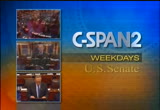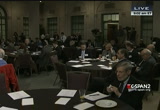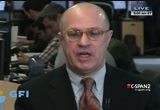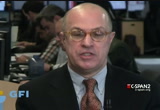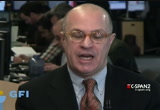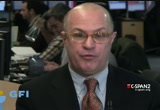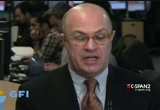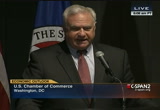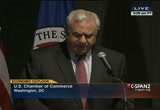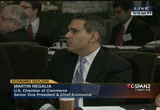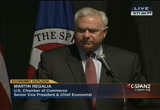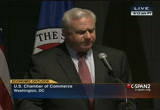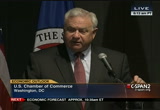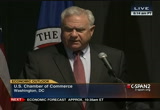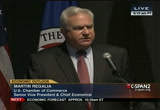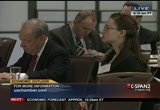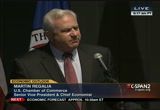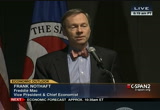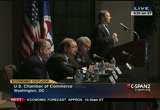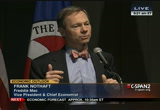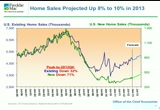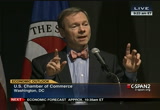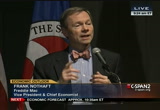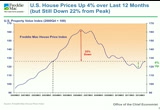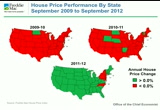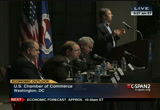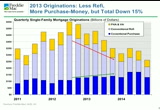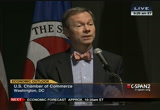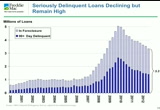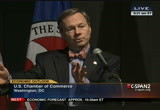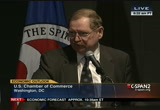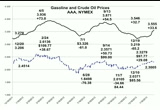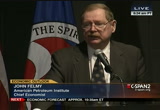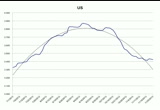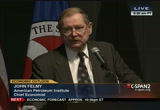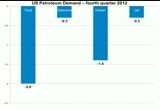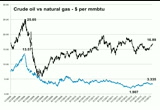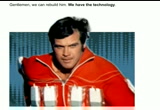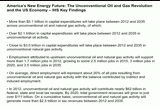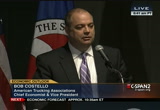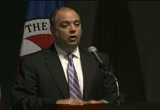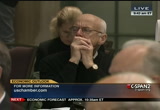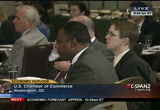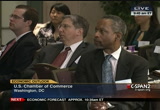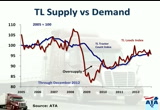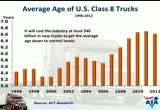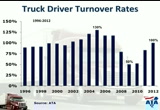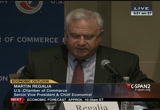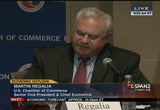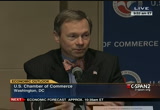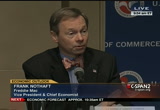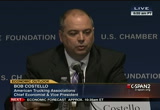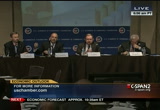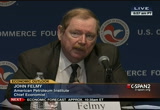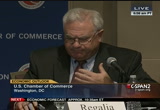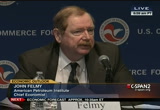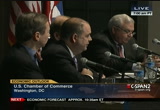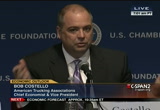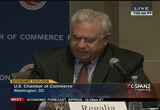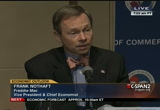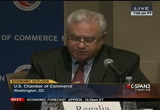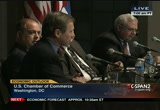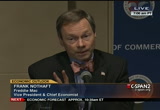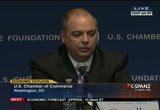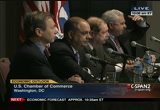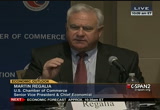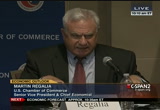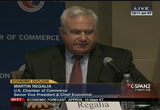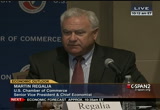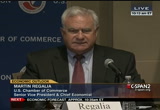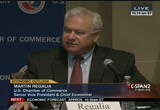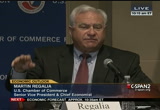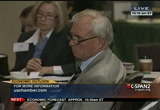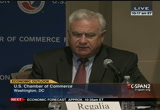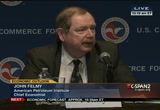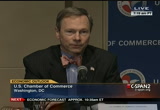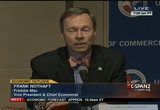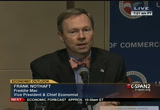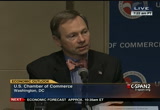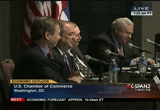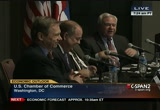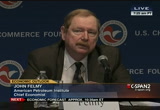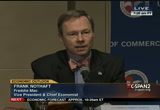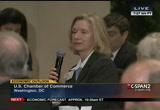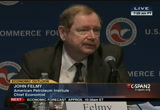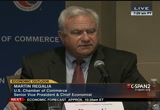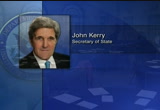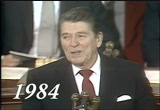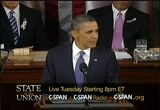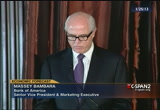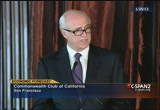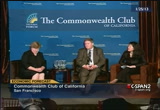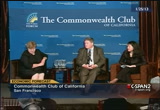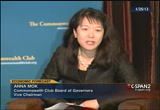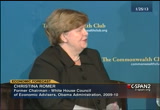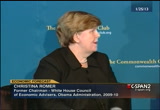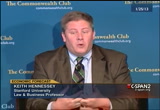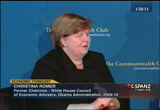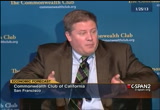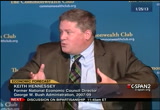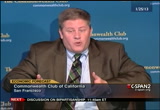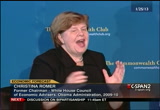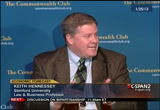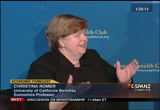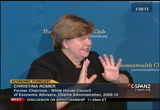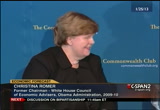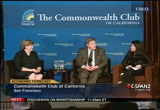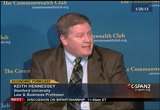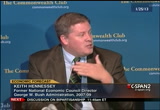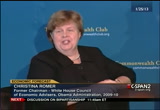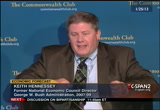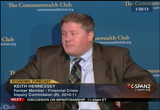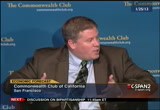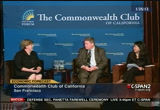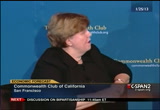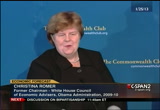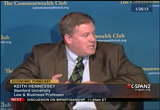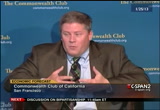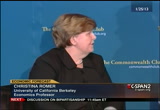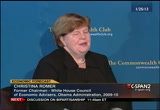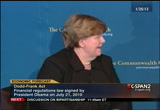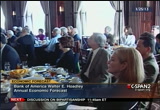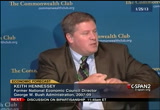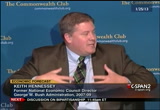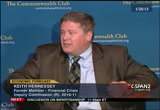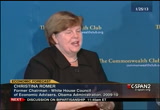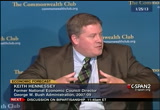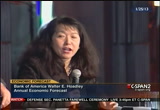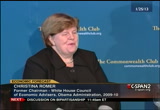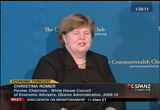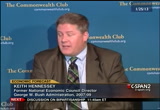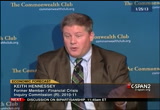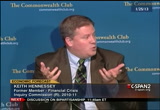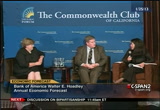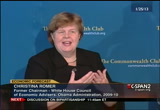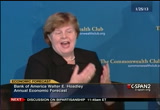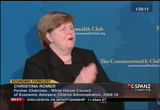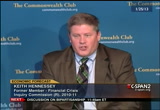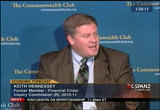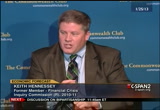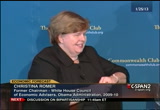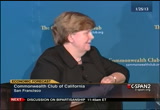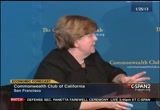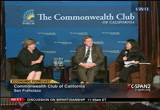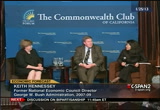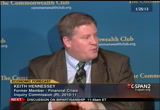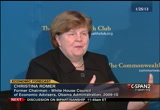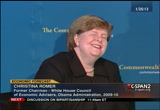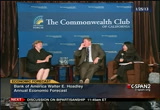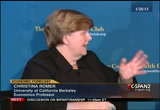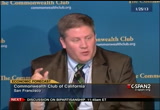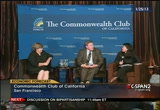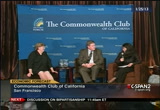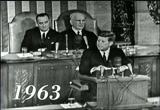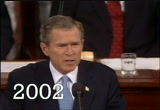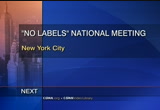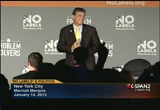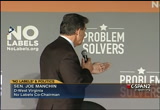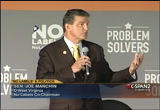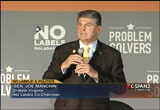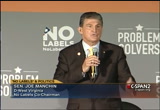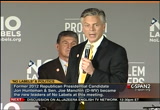tv U.S. Senate CSPAN February 8, 2013 9:00am-12:00pm EST
9:00 am
i'm not just defending strasbourg because it's in the treaty. i defend strasbourg because its history that seeks the role that strasbourg house to play. we celebrate the 50th anniversary of the treaty of friendship between germany and france elite, and strasbourg was part of that reconciliation between our two countries. strasbourg is both a history in the future of germany. it's the city that represents what europe is. i'm not just defending it because it's in france. europe has other seats in other countries. i defend strasbourg, strasbourg in europe. if you think that it shouldn't be the seat of the european parliament, then doubts undermines everybody's view of europe. so thank you very much for having me here in strasbourg at
9:01 am
the seat of the european parliament. [applause] [speaking french] >> translator: thank you, mr. president. >> you were watching c-span2 with politics and public affairs. weekdays feature live coverage of the u.s. senate. on nights watched key public policy this. and every week in the latest nonfiction authors and books on booktv.
9:02 am
you can see past programs and get our schedules at our website, and you can join in the conversation on social media sites. >> the programs that we had all under -- >> we are live now as u.s. chamber of commerce is hosting a quarterly briefing today on the outlook for the u.s. economy. martin regalia, chambers chief economist will talk about recent gross domestic product figure and what policy the obama administration and congress to propose to help stimulate the economy. this is just getting under way. >> a prime example of our ability to involve experts and debates on topics that are critical to the business community. i'm going to start us off today by queuing a video from christopher giancarlo of the gfi group, our sponsor, for this series. but for some want to make a brief announcement. this series, this economic series that we pose every quarter, has been accredited by the national association of state boards of accountancy to
9:03 am
provide continuing professional education, credits for accounting professional. so we are quite excited of that and hopefully you will as well. this accreditation highlights the value of this and other programs that would hold her at the chamber. for more information on that please visit our website, or speak to some of folks outside in the registration desk. after the video i'm going to ask marty to come up directly and begin the program the first award from our sponsor, the gfi group. >> good morning. gfi group is delighted to continue its support of the national chamber foundation's quarterly economic briefing. the goal is to affect the impact of public policy on u.s. bases and the global economy. gfi group is an american company headquartered in new york city with shares trade on the new stock exchange. gfi employs close to 2000 people and over a dozen offices and most of the world's major
9:04 am
financial centers. as you meet us when gfi employs are hard at work around the globe and here in new york and executing billions of dollars in transactions across a range of foreign exchange, interest rates, treasury, credit, equity, commodity and energy. gfi group is a wholesale broker come sometimes called an interdealer broker. the rest of the industry go back over a century in the world's major financial centers. gfi has institutional clients in transacting exchange listed products and also operates exchanges for things that don't trade on traditional exchanges, instruments that are instead traded over-the-counter such as swaps and other derivative instruments. 15 months ago congress passed the dodd-frank act including title vii that requires when possible that stock transactions be cleared, reported and execute on exchanges, or swap execution
9:05 am
facilities. congress recognized global swap workers won't be widely served by firms such as the gfi group. it was great to reflecting on standing role and recognize terms like gfi into the nod the new dodd-frank regulatory framework. the fec and the cftc are still at work on detailed regulations. that will impact the entire process of trading swap in the united states and abroad. getting those rules right now impact not just the large banks and swap dealers that make markets. but also the american businesses that use swaps to lessen the vouchers to better manage capital for growth and investment in u.s. jobs. those rules will reflect the effect not just wall street, but economic conditions on main street. gfi group stands for a swaps regular regime that improved
9:06 am
registry transparency, promotes competition and increases market participant access. gfi has been vocal in support of the clearing, execution, and reporting mandate of dodd-frank, through dozens of public writings and formal congressional and regulatory testimony. through decades of experience in the financial markets leads to concerned that some currently propose sec and see sec rules are overly prescriptive, may harm market liquidity, increase trading costs, and worse, may drive trading in some swaps products offshore. this result would negatively impact the u.s. capital formation and the u.s. businesses and jobs that depend on. instead, market regulators should probably implement the see reform of the dodd-frank act, central clearing, regulated execution, and enhanced transparency. without overreach and
9:07 am
complication. they must turn away from attempt to reengineer swaps markets with a series of one size fits all rule. and instead, turn to flexible, principle face approach that reflects the importance of these markets of u.s. economic recovery. it is time to get on with the work of putting u.s. swaps markets on a sounder footing with greater transparency, for proper financial risk management, allowing investing back to prosperity. gfi group is places for the national foundation in ensuring that all public policy, whether related to use swaps markets or in any other way related to u.s. business activity, is one examined for its impact on u.s. economic growth, market vibrancy, most critically, u.s. job creation. thank you for your time this morning. it's my pleasure to introduce the use chambers chief
9:08 am
economist, dr. martin regalia. thank you. [applause] >> well, thank you all very much for coming out on such a rainy day. to listen to economists. we will live up to our reputation as dismal scientist this morning i think. i'm pleased to have three very distinguished economists this morning to help me kind of sort through some of the economics, anderson's idea a little bit of five to 10 minute presentation, then each one of them are going to speak of and then we will sit down and can't have a discussion, open it up to questions from the audience. today we have john felmy, chief economist at api and who will talk to us about kind of energy. john won't do forecasting energy prices, but he will talk about the energy situation is looking and what we are seeing in terms of more exploration energies,
9:09 am
supplies, a huge sector in the us economy and one of has made a focal point of our growth strategy going forward. so it will be very interesting to hear from john. will also hear from frank nothaft was a chief economist at freddie mac, and frank is an expert. i've known frank for -- i was held on, because he looks much younger than i do, but it's a long, long, long time, and he is an expert in the housing market and i think that's one of, if not bright spots at least brighter spots in the economy today. and then finally we'll have bob costello was the chief economist at ata. in this economy we build stuff that would put on trucks and we move it around. so if you're trying to keep track of the trucks you can also keep track of the economy and bob does an amazing job of that. i'm happy they all agree to be here this morning. when you look at the u.s. economy today we see an economy that have started growing three and half years ago. the problem is that it never hit its stride.
9:10 am
it grew but it grew at an average of about 2.3% which is virtually our long run potential. and as a result we never made up the gdp gap from what was a very steep and prolonged economic downturn. so you've seen this chart in the recent cbo, a little different because cbo has that line kind of turning up and catching the red line at some point in the not-too-distant future, and i don't and that's because i'm not that optimistic. that we are going to see growth in excess of 4% as cbo has forecast. and without that, you don't close the gap. this is what really is the problem in the u.s. economy. we have grown. we are doing better than we were four years ago. we are above the blue line is above what it was four years ago when we were in the depths of the reception. -- recession. we are not really doing anything to get it back where it was. in fact, if you look at the last
9:11 am
three or four economic recoveries, you see that the ones prior to 1991 had the shakes. they fell off sharply and then they came roaring back as real we put people back to work for quickly. this one as the prior to, but even more so, kind of meanders along when they started back a. so we never really charged back with four, five, six, seven, eight, nine, 10% growth in real terms. we kind of wobbled along at three, then at two and a half, this time around at 2.3. that's the problem. and until we figure out why that is and what we can do to get the growth of backup, we are not going to close the gap. we're not going to get back and we will not put people back to work. we're still a million and a half or so short of where we were prior to the recession. the unemployment rate has held up in incredibly high. 7.9%, and that's only the only reason it's that low is because
9:12 am
the participation rate has dropped to a 30 year low. we have participation rates that we haven't seen since women started entering the workforce. 38, 39%, 37% of americans of working age don't participate in the economy. that is a damning statistic that doesn't seem to make it in to the front pages. and if we don't see any continued drops in the participation rate, which would be truly unprecedented, we're not going to see continued improvement in the unemployment rate. last month, 150,000 jobs, little bit worse than 180,000 average the year before, unemployment rate ticked up one-tenth of 1%. i really appreciate the euphemistic approach taken by bof when the parade was taking than one-tenth of 1% it was unemployment rate drops. this time it was unemployment rate remained virtually the
9:13 am
same. one-tenth down to one-tenth of kuroki can we are not making headway. that's the bottom line. and in order to make headway you have to get our growth rate a. it's not all bad news. because of this year we are starting to see finally some of the underpinnings, real cite underpinnings of the economy look better. the things that look the same our kind of self-inflicted wounds that our political process keeps tossing on the economy. so as you look at the housing market is getting better. frank will talk about that today. it's important and it's not just important because of jobs and because the more buildings and housing construction. it's important because the prices are starting to come back and that means the underlying value of the homes and the net worth of the average american is starting to come back from at that net worth will help drive consumption. we are seeing the fed continued a very aggressive policy.
9:14 am
very aggressive and they've given us some metrics to watch for, 6.5% on upon, to% and inflation. we don't see either of those in the forecast of future the next year, year and have so we think the fed will remain fairly aggressive. that's going to be a big plus for the economy. we see europe, it's kind of off the headline, and from europe no news is good news. so what we are seeing is no more talk about the euro exploding. we're seeing the euro strengthening of it. not really great for european growth, but not bad for hours. and we are also starting to see them kind of kick the can down the road on their debt problems, so they're not propping up with three-month regularities so it's a quarterly crisis. things have settled out a bit there. they're going a little bit better and there started to come out of the recession may have been in now for about nine months. and that's all positive. so those things look better. the whole energy sector is booming in this country, and that's a plus. and as a result, my forecast,
9:15 am
not john's, for energy prices is that we're not going to see the kind of, you know, early summer, late summer driving season spikes that are played economy in the past. able to lift up a bit from where they are now, but i don't see the kind of spiking that we saw in prior quarters, prior summer months. and that's a plus. so all of these things factor in. in addition, businesses both here in the united states and abroad have huge cash and none of these business go into business to hold cash. the problem is that the uncertainty out there, and the fact that the economy hasn't picked up so the capacity utilization in this country at about 70%, is low by historical standards. there's excess capacity even today. and so there's not the exigency to invest that has existed in prior economic upturn. we think that that cash is going
9:16 am
to start filtering back into the economy and, therefore, investment perhaps the second most important factor in economic growth will start to pick up a bit as the year goes on but it's going to be gradually, improvement will be gradual. and on the downside we have thrown a lot of roadblocks in its path. we have a debt and deficit situation which in the long term are unsustainable, and we're doing absolutely nothing to correct that. nothing. i know cbo's forecast was that we would see modest improvement in the jet crashing into debt-to-gdp ratio the next two years but i don't believe the. i don't like their forecast. i do with 4% growth is going to venture lies with the 0% increase in the interest rate. just don't see it happening. if you get when you're going to get the other one taking up and that will be very, very difficult to maintain a stable or declining debt-to-gdp ratio. but even cbo has a debt-to-gdp ratio picking up at the end of the 10 year horizon. so we have to stabilize the debt.
9:17 am
we haven't fixed the debt. and, in fact, we spread the crisis out so that we really won't go a month without one. we have the fiscal cliff at the end of the year. nothing was done in the later part of the year. and then in the 11th hour, actually it wasn't the 11th hour. it was about the 15th hour, two and half hours after we went off the cliff of the house hold us back on and in the senate a day later. but what do they do? they raised taxes, didn't cut spending, and essentially postponed some of the other issues, like the debt ceiling, which was going to come up very quickly in the new year, and now has been postponed to may 19. we also have a sequestration but was postponed for two months and that's coming back at the end of february. and if that wasn't enough we have a c.r., since we don't pass budgeting now, we governed by c.r. we have a continuing resolution debate and vote coming up on or before the 27th of march. so what we have done is we've
9:18 am
spread these crises out over the course of the whole first half of the year and that's going to be difficult for the economy to manipulate, because as we start istartto see fundamental improvt elsewhere, we will see continued refocusing on the inability of our government to come to terms with its spending, it's taxes, and its debt and deficit. and that will continually, i believe, while markets and call into question some of the more optimistioptimisti c factors that we are seeing. i'd like to call the panel up here, and we will start going through with we're going to do john first, and then we're going -- excuse me, we'll be frank first on the housing and then we will do jon and then we'll dupont, and will keep everything on schedule and we're trying to get you right out at 10:30. thank you. [applause]
9:19 am
>> thank you, marty. and i want to thank the u.s. chamber of commerce foundation for hosting the event here today, inviting me to participate. certainly my pleasure to be here. i have some slides i will refer to. in terms of the overall housing market, this is the most upbeat i have felt in years. we've had nothing but completely terrible news on the housing side for some time. we are starting 2013 to with a fair amount of inertia in the housing market. as you know over the past year, home sales are a. in fact, home sales are up about 9% compared to 2011, 2012 over 20 housing starts up about 25%, and house price indices have turned around. they all bottom out in 2012 and we've had some very good positive inertia on the housing side. and that i believe will continue into 2013. what i'll touch on today is a little bit on what's happening, what's really driving the housing market right now, what's driving housing demand, and i think a lot of it is based on
9:20 am
very low mortgage rates that helped to drive a ford built in the market place. i'll talk a bit about that. secondly, i will talk about some of the trends we've seen. house prices in natural indices are up five to 6% over the last year. i think we'll see another three to 4% increase in national house pricing in 2013. finally, i will share some thoughts on what we see for the mortgage market in 2013. let's first start with housing demand. as i mentioned we seeing a pickup in sales and new construction activity. i think in part this is driven by the high degree of affordability we see in the marketplace. and a very simple but straightforward metric of this is the national association of realtors affordability index. ipod that you on this target we intend to make it out. to hide the affordability index, these it is for typical come to afford to buy a home. the national association of realtors when they produced their a portable index the
9:21 am
incorporate three key ingredients that drive affordability for the prospective home buyer. those three ingredient our mortgage rates, house prices, family and can. mortgage rates, house prices and family income. and i plotted with those increase, the mortgage rates on the blucher. mortgage rates are at incredibly low levels. we are 33 year fixed rates at 3.5%, the lowest in at least 65 years. between that and the fact that house prices have come down substantially from their peaks really helped to drive affordability for instance, a national house price indices with a pickup we've seen this past year they are mostly down about 20-25% from where they had been at the peak of the house prices in 2006. so between mortgage rates at a 65 your low and house prices down substantially from their peak, that's driven
9:22 am
affordability to it very high levels. and that helps to encourage turnaround in housing demand, home sales and so when. there are still some very hard headwinds. marty mentioned them, relatively high rate of unemployment. we've had high unemployment for long periods time. that's a powerful headwinds pushing back on housing demand. unemployed people no longer biomes. the market has changed a bit over the last few years. but even with that headwind have seen a pickup in home sales. home sales were up about 9% over in 2012 compared to 2011. and we're expecting another eight to 10% increase in home sales in 2013 compared to the level in 2012. and i shows the level of home sales both for the existing home
9:23 am
sales market in lieu, and for the new home market in green. that is newly built homes in green. you can see even with the increase in home sales we had in 2012, and the projected increase in home sales in 2013, while we're moving in the right trajectory, home sales are still much, much less than what they were at any time, you know, from 2000-2007. so we are moving in the right direction to affordability is very high. that's helping turnabout housing demand, promote home sales, but even with the pickup in home sales at sales are still at a relatively low level compared to where they had been. i want to talk a little bit about house prices, and i'd like to think in terms of the forces that affect house prices by looking at the excess supply of vacant homes on the marketplace. and what i plotted here is in metric we put together that measures the excess above normal
9:24 am
supply of they can housing across the u.s. we look at both rental market as well as a single-family for sale market. and we had a large oversupply of vacant housing in the u.s. at the peak of the housing side. we had about 2 million, at least 2 million excess above normal they could housing units in the marketplace. and whenever there's a large excess supply in the marketplace, the force is for prices to come down, randy to come down in the rental market. indeed, that's what we saw after 2006, a lot of downward pressure of pricing, even rent in the rental market. let's take a look what happened over the last three years. we have worked off a lot of that excess they can supply. in large part because construction levels have been depressed.
9:25 am
we continue to have households, not as robust as they were maybe five or 10 years ago but we have had household formation over the last year there've been on net 1 million new households formed in the u.s., but we only completed about six or thousand new housing development. so that difference between what's new housing constructed and the total amount of net new houses formation helps absorb the vacant oversupply of housing that we see in the u.s. and so we have returned to almost a good balance between the overall supply and demand of housing in the u.s., it has helped to encourage a tournament in house prices. this is a thought that national house price index that we created, freddie mac, and you can see the big run up in house prices in 2006 and the big crash there have to. house prices over the last year by this metric are up 4%. that's the best news we've had
9:26 am
and house price in years, even with a 4% increase in national house price index we still have house prices down about 22% from their peak levels. i do anticipate further increases in 2013 the again, we are expecting about another three to 4% increase in national house price indices during the course of the coming year. was especially different over the past year is not just that national house price indices are starting to turn up, but the increase in home values have been very broad-based geographically across the u.s. and just to give you a real simple snapshot on that, take a look at the last three years in terms of the states that have seen increases in house prices and states that are in green are states that have had a house price gains over the past year. we can see 2009-'10, 2010-11, 2011-12. the last year has been remarkably different from the prior year's because the house
9:27 am
price improvement has been very broad-based geographically notches in the national index but throughout much of the country. if we look at the rental market what we've seen is a decline in rental vacancy rates which is a blue bars in outside over the last three years. rental vacancy rates across the u.s. are down about 2.5 percentage points where they had been three years ago. and with the declines in vacancy rates in the rental market, we have begun to see a turnaround in level of rent. rant is up over the last two, three years. national indices as well as many local markets around the country. and, in fact, just like in a single farmer for sale market, the decline in vacancy rates in the rental market again, very broad-based geographically. those markets especially that have been very hard hit by the housing downturn such as
9:28 am
florida, arizona, new mexico, california and so on, those are some the markets where we have seen the largest declines in vacancy rates in rental apartments over the last three years. i want to turn up and close with some comments about the mortgage market. so mortgage origination on the single-family properties for 2012 came in i think somewhere around $2 trillion. that's her estimate, about $2 trillion of originations with about 75-80% of the volume for refinance. our expectation is that for 2013 we're going to see an increase in purchase money originations, about a 10% increase in purchase money originations, but also we're going to see a decline in the refinance origination. i'll tell you why. many borrowers have already refinanced over the last year, 18 months. they have locked in low interest rates of a very unlikely to come back into the market to
9:29 am
refinance right now. furthermore, while we have the lowest mortgage rates and 65 years and would have been for a while now, i do think obese and gradual upward pressure mortgage rates over 2013 but i still expect 30 year fixed rates as you're about 3% today, to remain below 4% in 2013 them but they will be higher later in the event are now. divided into 2013 will begin approaching about 4% of a 30 year fixed-rate mortgage rates. that's going to choke off some of the incentive to revive. so while we have purchased many origination rising, we have refinance originations are now forecast coming down, and since that such a big part of the market today, that's sufficient to actually reduce the total level of single-family origination because we have been coming down about 50% 2013 compared to 2012, not because of purchase money, but because of less refinance. less refinance but refinance will still be the bulk of lending in the single-family
9:30 am
market in 2013. turning to the multifamily originations, these -- we saw a big pickup over the last couple of years, in large part because apartment owners are taking advantage of low interest rates and refinancing a debt they have on their buildings. they're expecting about 5% increase in multifamily originations in 2013 compared to 2012 come in part because there's been an increase in construction and transactions and multifamily apartment buildings, but also because they will be continuation of refinance activity. and then finally, i just want to close with the comment about the series leader link below to what i think as a proxy for the shadow inventory in the marketplace that we hear so much about. we have a large number of single families in the u.s. that are seriously delinquent, that is 90
9:31 am
days delinquent or in foreclosure proceedings. that has come down a lot. we had about 5 million single-family homes that had loans that were seriously delinquent three years ago. that has come down to about 3 million today. still, that's very high number, that's about triple what would we think of as an average, about triple what we saw 10, 15 years ago. in a single family markets are still at large stock of troubled loans we have. the industry as a whole has been working that down. still relatively high, and we'll continue to see properties come through the foreclosure proceedings cycle and come out as real estate owned and as aria sales in the single-family market over the course of the next year. what is so different in workplace today is that we have much stronger housing demand because affordability is so
9:32 am
strong in many home buyers looking to buy homes here so even as we continue to see some flow coming out in terms of reo sales in the marketplace, the increased demand for homes will still help to absorb fat, and provide room for increases in home values in the coming year. so thanks again to the chamber and the foundation for the opportunity to share our views, and i will turn it back to marty. >> thank you very much, frank. we will have john felmy from api next. >> thank you much for inviting me, marty. and thank you all for coming. we are just a couple degrees of getting to be just a which is traditional for the washington, d.c. area on presidents' day. i've lived here for 35 years and we had about 10 big snowfalls this time of year so we just dodged it is cheaper also want to thank you for coming out and hearing economists, since to
9:33 am
folks to take the opportunity will tell you a bad economist jeffrey what's the definition of an economist? as many of course but my favorite one is an economist is what is real good with numbers but doesn't have the personality to be an accountant. [laughter] so i'm going to do is go through, what's going on in the oil and gas industry, what the opportunities are and what we can do in terms of working in an important aspect of it come. the oil and gas industry of course is large. it's an important quantity of the economy. and so you have to pay attention to those facts in terms of how the overall economic situation is. so if we start first, this is what educational effort and so if you're getting credit for this, this is what's going on with gasoline and crude oil price. the top one is the retail price of gasoline according to aaa, the bottom line is the price of west texas intermediate from nynex in dollars per gallon.
9:34 am
if you just like per barrel cost it's hard to compare the two but if you just convert them in terms of dollars per gallon you can see how the two values move together. we have seen gasoline prices that recently over 30 cents account and using crude prices up by almost 30 cents a gallon. so there's no mystery in terms of what's happening between crude oil and taxes can you talk about 80% of the cost of gasoline and so when. and so what you need to do is just divide by 42 and that will tell you pretty much what's going on in terms of these markets. you can't have -- you can have other factors that can affect those margins, but that gap between the crude oil price and the retail gasoline price, the biggest chunk of that is taxes, roughly about 50 cents a gallon, federal and state. every thing else is defining, transporting and delivering a. i put this chart up because it also has an impact on the u.s. economy. the average household probably spends about $2700 on gasoline.
9:35 am
we use about 130 billion gallons of gasoline a year. so for every penny increase in the cost of gasoline, that's 1.3 billion that it spent more on gasoline instead of other goods and services. so there's clearly an impact one has to pay attention to on the. we've seen this over and over but if you look back over the last 40 years or so, that difference between crude oil prices and gasoline prices is averaged about a dollar something as i said, brother of that is 50 cents in tax but it concluded have an impact in terms of consumer spending and so when. let's see if i can get this to work at one of the big things that are also here is well, you know, gasoline prices go up like a rocket and come down like a feather. that's what everybody a search but it's not always true. so i look at the last two price increases we had over the last year, and you see that the jagged line is a refill price
9:36 am
and the other defines kind of symmetry actions of how fast they go up and how fast they come down. this was earlier in 2012 and you can see it's almost vertically symmetric. so when you hear those arguments, don't take them out so that face valley. the second half-year we saw another price increase. again, same case. i would be very careful about it. but irrespective of the, why are crude prices up so much was i like to say it's three defected. china, china, china but if what we've seen is record demand for oil worldwide, even though the u.s. is still a large player but much smaller than it used to be and as long as we continue to growth in demand in places like china, buying what, 24 million cars, growth rates of 7.5% followed by india, you see a powerful movement forward in terms of demand. and so with tight supplies, for chile we're seeing some positive aspects in u.s. and other parts around the globe so we haven't seen the real spikes. what you do see is a case of
9:37 am
relatively tight market. the u.s. demand is down, and this is reflected in. what you seems to demand is down, gasoline demand is down which is tied more to things that retail sales, employment and so on. diesel demand is also down and that's tied more to the production side of the economy, whether its production of exports and when. and i carefully compare these diesel demand numbers with bob's numbers because they should move together. if they don't one of us has a problem, but they pretty much followed each other. we've seen these of demand. jet fuel has been down for 2012 and a lot of that is packing place for them having more efficient fuel, more efficient aircraft and so on. but if i turn to the fourth quarter we can see that things are still down. in particular the diesel demand was down. when i heard that gdp was down, it didn't surprise me too much because that's so tightly controlled or tied into the
9:38 am
composer of the economy and so on. again we saw about decline in total overall petrone, total gasoline to me. the good news from this chart is that if you look forward in the january numbers we have some prevented data on it, both for apis weekly statistics and energy information administration's, we saw diesel demand down but we did see gasoline demand up. that's a positive sign but hopefully we'll see this continue. but i will agree after will delete week economy as reflected through the lens of the fuel demand. what else is going on? natural gas. if you look at the top line, that is the price of crude oil in dollars per million btu but the bottom line is the price of natural gas. you can see how much cheaper natural gas has become. it's one-fifth in some cases of what the per cost isn't so. why? because we have all these developers of shale gas around the country. we've got of course the big shale gas play in the pennsylvania area, my home
9:39 am
state, marsalis, which also got oil in north dakota, south dakota and solar. that's led to increase in production of both oil and natural gas, which is, ma five years ago we would have been able to insist that that. that's good news in terms of supply. it's good news in terms of energy costs. it's good news in terms of employment. one of the previous slides that was up that showed in 2009-10, joe sebok apposite increases was north dakota. that's not the price given what's happened that north dakota is now the second largest egg producer of oil in the country. why? we have the technology. those of you who remember the 6 million dollar man, lee majors, it's because we've had dramatic improvements in the technology and hydraulic brockton, horizontally but we've also had improvement in deepwater drilling and canadian oil sands development. so we've seen this technological improvements that have really dramatically changed the course
9:40 am
of production that we would've never dreamed of. so what i'm going to close with is that we have an opportunity based on an ihs study to generate millions of jobs, trillions of investment, and billions if not trillions of federal, state and local revenues. we have the opportunity to do this just for nonconventional oil alone. so basically what we have right now is a choice. we can either make wise decisions moving over to develop, indeed all of the above resources, including oil, gas, coal, nuclear, renewables and so on, or we can repeat some mistakes of the past. in particular some of the proposals for taxing the oil and gas industry are repeated mistakes of the past. and we have potential for more regulation which could slow down the whole process. and, finally, if we don't get access to resources in this country, we won't be able to develop those oil and gas resources. so we have an opportunity
9:41 am
once-in-a-lifetime, you know, in terms i've been analyzing energy for about 40 years. this is the first time i can say that we really can move forward so that between what we produce in this country, between imports from canada and biofuels, we can become energy self-sufficient from a north american basis. and i would've never dreamed that was possible only five years ago. something so much for your time, and i will turn it over to the next speaker. >> thank you. [applause] spent we will have bob costello now. >> good morning. thank you, marty. thank you, al, for having me. so i represent the trucking industry, and i think it is a sort of a unique view, a different sort of you do -- viewpoint. the reason is it is a $600 billion industry, and it halt 67% of all the freight in the u.s. so it gives us a very unique insight into what i call a good portion of economy.
9:42 am
we don't put services on the back of traders. but we put almost everything else, anything you can touch and feel. and so i like a lot of people like to look at this and see what it is showing us. as john said, this year, let me say with this is. eucalyptus volumes of trucking in a couple of different ways. one is the amount of weight that is moved and that's what john referred to, the tonnage. another one is number of shipments are we call it loads. they measure two different things. for a lot of freight, most typical box traders you see. often is completely full, you can put any more freight onto hd by your well below the federal weight limits. so doesn't always match out, tonnage has always match of the overall it was up 2.4% but in the fourth quarter it was off 1% from a year earlier. even if you look at the number of loads, that was only up 8%
9:43 am
lash and it was a 2.1% from year earlier. i'm going to show you why the difference is, because it gives us insight as to what's going in the economy. like a lot of industries, small firms in the trucking industry are having a particularly hard time. they are having a difficult time reinvesting the capital, turning over the trucks. i will tell you that in a minute. and their bond as a result are bound even more than larger carriers. like a lot of parts o of the economy, small businesses are having a difficult time. all right. this shows different sectors and it gives us insight into what is going in the economy and what's not. that's a typical boxster. nothing special about it. doesn't have a refrigeration on it. it's not a tank truck. it's not flatbed. and that you can see was off and off significantly last year. especially forthwith.
9:44 am
energy production of the law. you use sand, water, and a little bit of chemicals. all that, it all goes into trucks and it is all very heady freight. that's why tonnage overall is going better than the number of loads. that freight when you measure the weight counts were. very heady freight, that's flat bed. so again, temperature controlled is mainly food. although it's interesting, a lot more electronics are going in temperature controlled eric not have your degree but they don't want to get very hot or very cold. but most of temperature controlled is food. so anyway, this is interesting because it just confirms what we already know, we're producing more energy and housing starting to rebound.
9:45 am
9:46 am
and demand demand being the red line, the number of shipments and the blue line being the number of trucks we are operating, you can see when you got into the recession of course we had too much equipment on our hands. oversupplies and the price plummeted. but what happened? we started to see a rebound in demand and we kept cutting the fleet and now they are matched up. a lot of our transports are similar whether it is the airlines or trucking companies but are they trying to do? they try to get the capacity to reach the amount of demand it's
9:47 am
not just buying a bunch of sharks in anticipation of the recovery which is very unique and. we have matured as an industry. i said earlier we need to invest significantly in new equipment. this shows you that. it is mainly that large tractor-trailer combination uzi on the highway in the five and have your area would be historically the normal. we were approaching seven years and came down in 2012 a little bit but you are still six and a half years. to get that age down to where it's been in about five and a half years it would take an
9:48 am
investment of at least $40 billion. so it's very reflective of a lot of the industries and economy and those investments in the down time are nervous about the uncertainty and policy you don't want to hire to many people and invest in too many capital we have a lot of hard testing that needs to take place once the economy starts to do better. the last couple slices on labor. despite elevated on employment rates and so forth, we actually have a labor issue. lots of jobs in trucking. one way we know that this is going on besides talking to a lot of fleet's is we look at the driver turnover rates. if they are in very high demand, i call them the free agents of trucking. they can go to any -- if you are a good driver with a good safety record and so forth, you can go
9:49 am
to any company you want and they will give you a sign on bonus. a lot of companies give a sign on bonus just to come to them and start driving. uzi the driver turnover rate is increasing and we bottomed out at 50 percent. i know that seems high but that's probably about the floor for this industry. even in those times when we are calling less freight you can go to different companies. so it is the back up to 100% turnover rate with a lot of pressure in the driver market and in fact we have the trucking each year. i grew up in a town of 100,000 that astounds me. there's many reasons we need that many drivers. we will start growing the fleet more. you have to had a driver. no driverless truck said this
9:50 am
point. our drivers or older on average than most employees out there it is the number one reason. we had a shortage of drivers about 20, 25,000. because housing started to improve about 25% last year, the construction employment was up about 1% so if they start hiring more people because of the continued growth in the construction industry that is going to put even more pressure on our industry we could be short at the of the words the to end of the year months we have an industry that wants to hire a lot of people and you have to be on the road -- today it is about a week at a time before you get home. there are certain parts of the industry is longer than that for most drivers. so the economy has slowed, you
9:51 am
know, we talked to the trucking companies that say the freight is a little better this year but i feel a lot of a stalking happened in the supply chain in the fourth quarter since probably significantly early on. we need to invest in all of capital in the airports of the $40 billion for the good trailers and others, and of course we have an industry that is looking to hire in this economy. that's all i have. >> thank you very much, bob. [applause] now we get to the fun part of the programs we are going to open up for questions in just a minute. if any of you have any questions, write them down. there will be microphones circulating. address them to whoever on the panel you want to and those on the panel can jump in and give their two cents' worth.
9:52 am
it's not a deal where we give one question or one interviewed before we get to that i want to ask some questions and the first one is also to bob and john as well and that is what are we seeing in terms of the lending availability? in the housing market specifically we see great rates and high affordability. are the banks starting to lend again? is there an availability of credit and the same in the trucking area. they are not precious with cash for the most part. what do the financing options look like? in terms of the commercial loans, the companies generally don't use bank as a primary source but what is the availability of the credit for them to expand into this growing energy supply? how quickly can we get in and start to take advantage of this? we will start with frank and
9:53 am
moved across. what is the bank lending situation or the availability of the credit situation in your industry? >> it's gotten better. we have about $2 trillion in the senior family origination and 2012. that is the biggest that we have had about three or four years in a single-family space and there are certain products that are not available that have been available at the peak of the program but those are the high risk products that disappeared from the market so you don't see the sisters, nina and sissa, nina de no dak loans. fairly common and 06 and the beginning of 07. those bills have gone away but what we see now are fully documented loans, fully documented underwriting and the
9:54 am
fixed rate 90 to 95% of all of the loans originated or the long-term fixed-rate mortgages. i think lenders have been a bit more cautious in recent years. in 2006 and 2007 what happens in terms of the regulation in the qualified mortgages and residential mortgages and once the rules come out it provides more certainty for the lenders so they can decide what's the right perimeter they want to underwrite going forward. we have seen better availability on the commercial real-estate side compared to the single-family side. so on the commercial side, we began to see listening of the credit underwriting standards.
9:55 am
>> very good. in terms of tracking the companies, it has gotten better as well, but i would say that it's still a challenge for my industry. one of the biggest challenges we tavis our equipment costs have surged over the past few years believe it or not even in the deficit of the recession and the reason is we actually had it epa mandated insurance, we had the fuel change and then we had the epa mandated engines that changed from 06 to today and what that did to the cost is a typical we call with a tractor the truck that hauls the tractor-trailer and 06 would cost about $95,000 to get that type of vehicle today it is $125,000 as we have added so much more equipment for the environment. the good news is it is much better for the environment. but there has been a cost associated with that.
9:56 am
so, costs are up and the lending is not what it once was. so we have many -- i showed you the small fleets are not growing the number of trucks they operate. in part the reason they are doing that, and i also showed you the age has gone up significantly so they are not worth as much as a 3-year-old truck, so we have many small fleets having to sell used trucks to afford one new one. part of that is because they cannot get financing for as much so they have to put more down. the of a thing on this that i have seen over the last two years is lease financing used to be 10%. any trucks that you would acquire in a year especially the smaller fleets would be maybe 10% of the trucks would be from the finance leasing and the rest of the purchases. today is 30 to 40% because it is the only way that they can get
9:57 am
it. they can't get all of the financing that they need for the purchasers comes of they are turning more to the leasing. it is a challenge and one that is holding us back a little bit. >> i would have to agree with that. there are thousands of small wheel and gas companies that rely on financing for moving forward for the investments they make and things are improving but there are a couple complicated things that are kind of interesting. one is dodd-frank the potential regulations in terms of how you classify certain contracts whether they are traded on exchanges versus bilateral deals where you get financing based on the ultimate outcome of your production, and those things we are still working our way through so they could be problematic. the other thing that is interesting in the industry that is a challenge has to do with housing. for some of the areas where you have seen like north dakota, a lot of workers move there and the need housing. unfortunately in terms of getting a mortgage, there are
9:58 am
some rules that can prevent you from getting a mortgage if you haven't worked at a job for a certain period, so for the areas that has been a limitation in terms of labor and i was talking to a banker in north dakota. if there was a wave you could deal with that you would get a lot more housing and workers and production. >> i'm going to start with you and the others can cheyenne, too the industry and the potential for the growth in that industry driving growth in the u.s.. how fast -- and you talked about some of the obstacles but held fast can the energy be exploited and how fast can a show improvement in the general economy? you are not going to go from finding this stuff on the ground to pumping it in the tank in six
9:59 am
months. but you would start to see i think fairly noticeable and preference in the u.s. economy if we were to exploit these natural resources to a much greater extent so how fast can we do them and what do you see as the obstacles cracks >> one of the biggest is getting access to the resources. we have a vast amount of oil and gas in the country that off-limits to the east coast, west coast, alaska. until you open the areas to be able to start the whole process, nothing can happen so we need to move forward on the five-year plan for the areas that have been delayed. we need to carefully look at some of the restrictions that we have seen over the past four years so once that happens you can start a schedule of the environmental assessments you have to do and then you start
10:00 am
leasing and then you have exploration activities so it can be a couple years before you start drilling so the key thing we need to do is move forward as quickly as possible let's open these areas and go to the process that has to be done because then you can start getting the lease revenue coming into the government you get royalties from production and everything else that falls along in terms of the investments and jobs and so on so the big aspect is access but if we have regulatory policies to come into place that slow them down then it's even more of a challenge. >> where do you get the trucks to facilitate this kind of growth? you pointed out the flatbeds,
10:01 am
the trucks were extractions related and there is a shortage and i guess you can't just take any truck and turn it into a flat bed or tanker can you? >> you can do certain extent. i have a large number that has taken 500 of his trucks where should the freight was down and he moved it over the sector to help with a natural gas at the north dakota and sorts. actually the challenge is getting all the tankers that are needed. the manufacturers cannot build them fast enough. the interesting thing on the energy side i might add there's a lot of interest as you might imagine by the trucking companies to get natural gas trucks, not the local delivery trucks that you see but the big heavy-duty trucks and you have the fuel that costs half on the
10:02 am
per gallon basis so there is a lot of interest and i get a lot of questions about that but there's obstacles. bonn is today the trucks cost 50 to $60,000 more than a diesel so you add that to the 125 fight told you earlier and then you get your maintenance facilities and so forth. but there is a lot of interest in the industry for a small portion of the heavy-duty and fueling that is another issue on the trucks to natural gas. >> we've heard about the holes in shortages and rental shortages and the like in some of these parts of the u.s. where we are starting to see the energy pickup. you don't 58 gove with a light switch to law starting to meet that demand and see those areas with rising housing prices, are
10:03 am
we seeing more construction in those areas? are there shortages that are specific to those areas and things we should be doing in anticipation of more growth in these areas? >> we have seen a pickup in those markets. john mentioned north dakota as an example and they have one of the strongest housing markets for years already the turnaround in the demand wasn't just in the last six to 12 months in north dakota. it's been the strongest for years. if you look at home values they were up sharply already three years ago in north dakota reflecting the demand for housing and builders have responded to building a fair amount of rental and north dakota as well so there is an increase in the new construction on a percentage basis anne
10:04 am
gurley the strongest increase we've seen in the new starts compared to other states in the last three years. >> we received a little bit of black when the chamber started to focus on the area and people focused on a very narrowly as the gas production but in effect housing demand and supply, trucking and many small businesses and it affects not just the fund mental and put but there's a lot of other pieces that drive growth and gdp growth and job growth if we would pull some and get a better mix of regulations can really start to exploit some of these resources that we have cash. next question and then i'm going to turn it over to you out there. the q4 versus what we are seeing
10:05 am
-- we've seen an economy that's been going pretty consistently, but in a pretty -- for three and a half years. there's been a couple of good quarters and a couple of bad quarters. the fourth quarter was one of those bad quarters from a top line number. i recruited a little bit in my presentation because i think we need to start to peel the onion down a little bit. you see the consumption growth was much stronger in the fourth quarter than in the third quarter. it was federal spending pretty much defense spending. how do you look at that fourth quarter compared to the first half of this year? is the harbinger of things to come or is it going to look like an aberration in their rearview mirror i will start with frank and then move this way. >> was a bit of an aberration and one of the positives i saw in the fourth quarter was the contribution on the housing sector and that is the residential investment.
10:06 am
to become. for much of the recovery the housing hasn't been there. housing continues to weaken and be a subtraction for economic activity in 2009, 2010, 2011. finally in 2012 housing began to contribute and takes up in the housing starts and flows through the residential investment and the investment contributed about four tenths of a percentage point in the overall gdp or helped make it less negative. of what we are expecting to see is a bigger role for housing in supporting economic growth in 2013 to the we are expecting that over 2013 housing in the residential investment will contribute close to half a percentage point of overall gdp growth. >> i'm in the same boat i'm not overly concerned about the
10:07 am
trading. last spring i was starting to get concerned about inventory levels and the supply chain and something we were hearing from our members, their customers and those showing up in the inventory to sales ratios so, a big chunk of that was to change the d stocking a few well throughout the supply chain saw you saw that the numbers were off on bud year-over-year period in the fourth quarter and even more so than the gdp reading. i look at this as a positive and if we get the inventories back to where they need to be that will help the volumes this year so not overly concerned, and again, we did like to see the business investment and household consumption pickup. islamic is a continuation of you
10:08 am
see in the recovery. the beginning of the recovery what we saw was the weak gasoline demand and that is driven by employment and sales and so on and that's consistent but for much of the recovery come to that fairly strong diesel demand in the that is consistent with a lot of the data but then you started to see the shift through last year, 2012, ultimately ending as i said with low were diesel demand and the fourth quarter relative to gasoline. as i mentioned going forward we have seen a continuation of the low diesel demand from the preliminary data for january but we have seen a rebound in gasoline which is consistent with some of the sales data and so on so it seems like the ship is turning a little bit. >> now we are going to open up so if you have a question put up your hand and we will bring in microphone around and i identify yourself and direct a question to anyone here and we will see what we can do with it. do we have any takers?
10:09 am
>> good morning. exxonmobil. my question is for you what. sometime in the next few months to the point of your remarks we are to be faced with sequestration we are in the beginning of some kind of a reduction in government spending. can you give your sense of how you think that might play out and what the implications would be for the economy? and given the fact that consumer spending would is still probably about 70% of the gdp what the implications for the consumer? roi >> i think the sequestration the worst aspect of the sequestration is not the overall cut because we know we need to trim spending and change the trajectory going forward ahead. predominantly entitlement.
10:10 am
without that i don't think we will get the budget under control and some point we will be downgraded by the other agencies and of some point we will start to see interest rate increases that the people that hold their debt to around the world less interested in holding it with very low interest rates. all of those will affect the u.s. economy. so that having been said when i look at the sequestration i don't look at the cuts as really impacting the economy in a negative way. they are not keen to help growth in the short term, but they have offsetting factors which mitigate the negative. the problem with sequestration is the way the cuts will take place because what we tell the congressman and the senators that's why we send them here we send them to spend money. that's absolutely what we do because we expect them to provide public goods, infrastructure, education,
10:11 am
national defense so we send them here to spend and we know in order to pay for those goods we have to what tax so that they are year to do is to spend and attack what we hope they do is prioritize. we hope they look at what is out there and see what do i need to do first, how much do i need to do and only do that and sequestration with flies in the face of the reason for sending them here. it obviates the need in the legislates against the prioritization. we tell them go out and locked everything the same. anybody that's coming budget whether it is divisional budget, department budget, company budget knows the ball game and we have a little bit here in little let there and we put a project in that maybe we don't need and we know that if we get cut we are going to cut that one
10:12 am
first what. with this at is we can do that. go and function across and just take off what would. that is stupid policy. what we ought to do is find a way to prioritize these cuts. think about it. that was the job of the super committee. there was an agreement made a couple years coming year and a half or so ago that you would get a debt ceiling increase and there would be 1.2 trillion in cuts and get the second increase for another to the super committee was to put together and they were supposed to prioritize. they were select members of a congress that were supposed to prioritize and a dandridge. kind of knowing they might not do it the congress said we are going to put something that is so draconian and stupid that nobody would let it happen and low and behold that is what we are dealing with. that is a sad state of affairs from the political process it's
10:13 am
a very sad state of affairs. so now to come back and say what we should do with the sequestration, i find it amazing the president who talks so much about balance and fairness, a year ago balance on getting the budget under control was four for 01 in spending for every dollar in tax increases and then as we went along we salles the discussion shifted and the prospects rose and fell the balance became 2 for 1. then in december after, the talk was kind of 1-1 and then there was zero was spending a cuts to the tax increase and now we are actually hearing negative. it's not 2-1. the president wants to cut those the were already made in the future and he wants to replace the agreement which was then you would do this to bed
10:14 am
sequestration policy of congress couldn't come up with a prioritized cut and we are going to replace those with more tax increases and by the way, john, thanks for stepping up. >> okay because they are all aimed only oil and gas extraction industries and things like that. so, this isn't a good policy. what we would like to see is some prioritization. should we do away with the kutz? that isn't a good thing either because when you look down the road we have not established a sustainable fiscal policy. we have a policy that under the forecast starts to turn up and the debt to gdp ratio starts to rise and by the way if you look at the interest-rate assumptions underlining those, they are pretty pollyanna. even beyond that, very, very
10:15 am
modest increases in interest rates. think about it with $16 trillion in debt, every percentage point increase in the interest rate is about 160 billion to the debt service and that very quickly starts to cause an increasing spiral. i worked a couple millennia ago we used to worry about the debt and deficit to gdp ratio of the 5.5 to 6% because that was the range which they could start to spiral out of control. we haven't seen anything remotely close to the deficit to gdp ratio of 6% in the last four years. by the way, even under the best assumptions we are looking at another two to three years before we get down to the 5% rate. so i think we need the kutz. eddy should be prioritized. those cuts across the border are
10:16 am
going to affect certain industries more than others. the defense industry is going to be impacted at more than others. we have to make a decision on how we want that to play out. you obviate the need for an across-the-board cut and there's not a good public policy. so i think the cuts are necessary. i don't think the cuts are so large that if they were instituted to come if the congress were to sit down and pick and prioritize the appropriate cut that they would lead to an economic downturn. when they were talking about the fiscal cliff they're going to lose $500 billion or more in the sequestration spending and increased taxes if you did nothing. and the $500 billion, 550 million-dollar total would cause a mild recession of something on the order of about half a percent of three tenths to five tenths% of gdp to look
10:17 am
at the forecast or cbo. so now we're talking about a sequestration is one-fifth of that and we've seen some tax increases the or possibly another fifth of that, so we were looking at something where we got 40% of that. i don't see a recession coming because of that and i think that there was and factored into that because in many cases, it reverts back to a very static approach. you do not look at what is happening in the housing which i think could be better than what many of us think. i don't think we are looking at the energy sector that has done tremendously well and could expand as well under the next as it did over the past and if we prioritized it would set the stage for doing even more of that on the road. >> i think in terms of energy you are right we have an
10:18 am
opportunity to move forward to generate jobs and energy security but it's going to take a conscientious decisions in terms of making decisions like, for example, the keystone exfil pipeline because you immediately start generating jobs and in all of the indirect effects. but unfortunately, what we have is a debate against it for some reason that somehow the opponent's think that stopping keystone xl will stop developing the oil sands, that is not true. they are worth something like ten times the gdp the notion they wouldn't be developed is silly so if you believe and environmentalism will bring it here because it is more the missions. we need to make decisions in terms of things like exports of energy. we have an opportunity with so much gas we are producing that we can export at a good price which keeps jobs in the country and so on so there are positive things we can do beyond the
10:19 am
budget process that will help the economy right now. >> other questions? >> we have one over here. >> the american public transportation association, you had some interesting facts on some of the subsets of the housing market. one might you have any observation on the new trends in housing perhaps try and caused by the board by generational changes or anything the housing market? was >> has the desire changed in some way with compared to the attitude several years ago? my take on the surveys over the
10:20 am
last few years is that desire for homeownership at some point in the lifecycle has not changed. families today are being formed and creating households. several of seem desirable for home ownership as younger cohorts. one thing that is different is a recognized of about to put my financial house in order first and save more money and there is recognition they are making a larger down payment. but i think that we will see over time they will have the same ultimate home ownership rate over their life cycle they may delay the time what they become a first-time homeowner.
10:21 am
over one's life cycle plus to 90% of households become a homeowner at some point in their life cycle that's a different number than i'm talking about. it's all households today that are renters the households of many different ages, young earth cohorts, old cohorts and 80 to 90% of all homeowners are at some point in their life cycle so that has not changed but the age at which people choose to become a first-time homebuyer in the transition to homeownership i think may have changed and i think that is probably going to be delayed relative to.
10:22 am
the rate of household growth will continue at about 1.2% per year. that is the production and we have about 120 million households in the u.s. if we do the math it works out to something new like 1.4 million new households per year. we had a pretty good year since last year and i think the trend is looking pretty good going forward which is good if you are a homebuilder and you've been able to survive the downturn so
10:23 am
far. >> in that formation and the net of the 40-year-old kids moving back with us. >> that is the take away and i don't know if i can convey that appropriately. >> that's right. they moved back into their parents' basement. >> other questions? >> when we look out there at these fiscal problems and the discussions, we have a state of the union coming at next week. what in your area would you wish for that what surprised you come and what do you expect? i will start with bob ho in the middle and we will work to the extremes. >> one of the things that we've been struggling with for a number of years and it's been a great partner with us and we are
10:24 am
not investing enough in our infrastructure. that's good government spending and creates a lot of jobs to increase its productivity in the long run and you have an industry here. how many industries do this? it's been saying for years please contact me more. we want the tax to go up. and so we would love to see some progress made on this. we've gotten so desperate in this area that we are not talking about perhaps the needs because politicians can't make a decision on this and haven't since the early nineties on a federal level maybe we need to go to the index. >> but you are talking about a fuel tax for the infrastructure and not to pay for subsidies, right? get one sold off against another and what we need is more infrastructure and that is a public good and that means to be paid for and generally with the
10:25 am
tax revenues. so i don't think anybody is faulting that. i think it is sold that we need more fuel tax and we can use that to reduce the deficit or pay for something else. the appeals tax was intended whether it's done successfully or not intended to pay for the infrastructure. >> absolutely, diversion. >> we are not happy about that. >> john, what are you hoping for? >> for some reason i haven't been consulted on that. the president in the campaign said he was four and all of the above energy policy so let's have some announcements that support that and move on these big decisions like keystone xl and leasing decisions, the five-year plan. really the things you need to do to be able to accomplish all of the above policy. i would say that we would also -- i would like to see us stop this discussion about taxing the industry and try to characterize
10:26 am
the subsidy which is simply not true and i would like to see more opportunities in terms of where can we open up areas that are off-limits right now because all of those combined can generate an enormous amount of opportunity for the economy right when we need it. >> frank? >> i will just mention a couple of things. one thing is i think the lenders have been concerned about the implementation of the new regulations that affect the housing market. to the extent we get more clarity and certainty for with the framework will be like going forward i think the lenders can take advantage of some of the flexibility once they know what the rules or in extending the credit. i think it is an important one and its financial literacy to reach out to the industry to try
10:27 am
to promote financial literacy and education. we have an educated group of young folks that understood the importance of having a financial house in order, the and importance of having a good credit history and understanding what this means to be smart about using credit whether it is in the mortgages are the consumer or even student loans. >> thank you. one last call for questions if there's any help there can we get a microphone over here? and we are on this on time. >> i represent a mobile technology, broadband providers and probably all of those in the trucking industry and oil and gas is using more in this operation. anything the panel can say generally on the continued growth in the mobile broadband and technology generally? >> certainly from a trucking perspective, yes. it's been absolutely critical to
10:28 am
the industry over the last decade or so. the days of the drivers going to the pay phones and calling in for the next load now it pops up and tells them exactly where to go and when to be there and so forth and there's a lot of the penetration probably isn't even all the way there yet in trucking and there's a lot of opportunities. that's something they are willing to invest because it impacts the bottom line. >> the ability to capture what's going on in terms to distribute that back to the central location for the analysis dealing with understanding what is going on is essential to moving forward to be able to develop our energy resources much more quickly and efficiently. >> when he mentioned the payphones i chuckled a little bit. do they still would assist?
10:29 am
>> this has been an interesting discussion because it is an economy that when you look at there is a whole list of positives in the housing and energy. what's happening in the energy area yet what is happening in europe and abroad then there's a list of negatives and virtually every one of the negatives is self-inflicted. we have the potential for this economy to break out of the doldrums, push it above the 2.3% and may be significantly above it, but i think that our policy options or what is holding us back. but i would like to hear and see in the state of the union is a plan for addressing the long-term deficit over a reasonable length of time, one that does recognize and specifically addresses what is going on on the spending side and tells us what they are
10:30 am
thinking specifically on the tax side so that there is some evaluation that can be made. i think that would go a long way towards stimulating a debate on entitlement reform and tax reform and the congress, and that i think would be a plus for the economy as well so it is not all bad news even though it is a lousy rainy day i want to thank all of you for coming and hope we can do this again in a couple of months. thank you very much. [applause] >> [inaudible conversations]
10:31 am
as the chamber of commerce meeting comes to a close it is available anytime on the web site, go to c-span.org and search the library. some news that moved before they got under way during the chamber of commerce meeting the associated press report in the u.s. trade deficit narrowed in december and the imports plummeted and total exports rose. a smaller trade gap means they unlikely performed in the three months of last year than first estimated last week. we are also learning secretary of state john kerry is meeting with canada's foreign minister and one of the subjects they are going to discuss the controversy will keystone pipeline delude bring the oil from canada to
10:32 am
texas over the transnational pipeline. that meeting is scheduled for 2 p.m. with a press briefing after words at 2:30. we plan to have that leader on the c-span networks. we have more live programming to tell you about on the program today. defense secretary leon panetta will be honored having observed a steady improvement in the opportunity and well-being of our citizens, i can report to you that the state is old but the union as good. >> once again, keeping with the time honored tradition i've come to report to you on the state of the union and i am pleased to report that america is much improved and there is good reason to believe that improvement will continue.
10:33 am
>> my duty tonight is to report on the state of the union. >> not the state of the government, but of our american community and to set forth our responsibilities in the words of our founders to form a more perfect union. the state of the union is strong. >> as we gather tonight, our nation is at war, our economy is in recession and the civilized world faces unprecedented dangers, yet the state of the union has never been stronger. >> it is because of our people that our future is hopeful an hour journey goes forward and the state of our union is strong
10:34 am
first lady helen taft on discussing politics. >> i always had the satisfaction of knowing almost as he about politics and intricacies of any situation. i think any woman can discuss with her husband topics of national interest. i became familiar with more than politics. it involved real statesmanship. to now the annual bank of america economic forecast discussion
10:35 am
from the commonwealth club of california. economic advisers to presidents george w. bush and president obama beebee did the future of the economy as well as health care, education and entitlement policies. you will hear from the former chair of the council of economic advisers, christina romer and the bush economic adviser keith hennessey. this event from san francisco is just over an hour. >> midafternoon and welcome to today's meeting of the commonwealth club of california. i am massey bambara, the president of bank of america, a member of the commonwealth club board of governors and george chair for today's program. we also welcome the listeners on the radio and television and invite everyone to visit us on the internet at commonwealthclub.org. today we are pleased to present the economic forecast named in honor of the club's late past president and longtime board member dr. walter holey who
10:36 am
served as the chief economist and vice president of the bank of america. today's program is sponsored by the memorial fund and bank of america. today's program will feature a distinguished speakers with distinctive viewpoints. dr. christina romer, professor of economics at the university california berkeley and former chair of president obama's council of economic advisers. and mr. keith and hennessey who teaches at the stanford university school of business at stanford law school and served as director of the national economic council under president george w. bush. keith hennessey served as both director of the national economic council as assistant to president bush for economic policy. as a director of the national economic council during the 2008 financial crisis, mr. hennessey was at the center of one of the most volatile times in american history. she was a senior white house economic adviser where he coordinated the design of the president's policies on taxes,
10:37 am
health care, pensions, energy and financial markets and institutions among others. mr. hennessey spent more than 15 years and economic policy rules for the senior elected officials. before his time in the white house, he worked on capitol hill for more than seven years as economics adviser to the former senate majority leader trent lott. since leaving the white house, mr. hennessey has been a television commentator and start a blog named one of top 25 economic blogs by the "wall street journal." he also served as a member of the financial crisis inquiry commission. mr. hennessey holds an undergraduate degree from stanford and master's degree in public policy from harvard university school of government. as the chair of president obama's council of economic advisers from january, 2009 until september, 2010, dr. christina romer was one of the four economic principles who met with president obama deily to design and guided the
10:38 am
administration's response to the great recession. dr. romer played a role in the administration's macroeconomic policy, reform of the financial system, health care reform and budget policy. inexpert of the history in macroeconomics, dr. romer is a scholar on the causes of the great depression and impact of monetary and fiscal policy. in addition to the current roll at the class of the 1957 wilson professor of the comics of the university of california berkeley, she's also the director of the program and monetary economics of the national bureau of economics research. dr. romer as a regular contributor to "the new york times" column and a contributing editor for bloomberg television. dr. romer holds a graduate degree from william and mary and ph.d. from the massachusetts institute of technology. today dr. romer and mr. hennessey will be in conversation with mok the
10:39 am
partner at deloit and tusche. please welcome mr. keith hennessey come christina romer and ana mok. >> thank you, for the introduction. i is preparing for today's general seminar [inaudible] you had someone and then another [laughter] >> they will make sure and have different views and the enlightening conversation will of good questions from the audience. of what started out with the beliefs. we had earlier in the week the inauguration of president
10:40 am
obama's second term in getting into the view there's a lot of questions on how she's doing and what the administration is going to do given what happened in the recent election. hal is the administration doing? >> certainly what is true is the american economy has been through a very rough five years and the president obama has been president for four of those. so it was certainly a baptism by fire in terms of what he faced coming in. yes, i think that the administration has taken so incredibly important economic policies. everything from the recovery that played a key role in helping us to turn the corners to health care reform which i think will be important going forward for the health of the economy, the financial regulatory reform, all of those things. so i think that he has
10:41 am
accomplished a great deal. unfortunately, there is still a lot more to do and i think that the big issue looming, or so many big issues everything from immigration reform to gun control, we have to send the address for the things he definitely wants to tackle the the one he's not going to be a will to avoid is the fiscal situation that we have a lot of the four seem events that has to happen before the debt ceiling and what are we going to do with those and the money that is supposed to be cut, those are issues he's going to have to face and i think much more important is the long run budget deficit that all of us what our policy makers to come together and figure out how we are going to deal with it. i think that is going to have to be front and center in the next year coming up with the solutions of that and i sure hope it is. >> the first thing to remind
10:42 am
ourselves of is the impact of a president on the short-term macroeconomy is always exaggerated. the president can have a big impact on the economy in the medium term and the long run largely through influencing congress. they have a dhaka all they can turn we look to the white house and say what are you going to do about the economy right now. dr. romer and i would go on tv at various points of time and talked about the jobs report and what was going to have been over the next month and what is first reading is you know in fact not much that you are doing has a linkage to what is going to happen over the course of the next month but i think it is interesting how it has shifted. if you are talking about the economy is about the long-term situation. now the economy is still weak. it's a lot healthier than a was four years ago yet none of the
10:43 am
discussion is of the short term. it is entirely but the medium term siskel picture and i do not see us making any significant progress on that any time in at least the next two years. i think that they are held and it is going to be sort of arguments with little progress over the next couple of years. >> let me jump in for a second here because you said you wanted to talk about the debate. i think the focus has and all changes to the medium-term deficit. in fact i think the reason it is sort of front and center is because it has to be part of the discussion of do you do anything more than jobs. so i think the president cares deeply about the fact we have an unemployment rate just slightly below 8% that that is an unbelievable tragedy but i think realistically if you are going to do for infrastructure
10:44 am
spending or make the kind of investments we need to make an education that might put people back to work now and make us more productive in the future. the only way that you ever get a congress to go along with you is if you also say let's make this part of a package to deal with all of those other things. so in my ideal, dealing with the medium term situation is making the space to do the things you need to do now. >> to move the needle of your calling on the fiscal policy to have short-term in practice you have to pull pretty hard. in 2008 you actually president bush proposed and the congress quickly enacted what we then called the fiscal stimulus bill and on the right of the aisle it is not, you know, it isn't forbidden to call it that. it is a bipartisan bill that is
10:45 am
amazing that we have bipartisanship at that time it was $150 billion. it was $150 billion pushed over an 18 month period and we figured that that was probably at least the smallest size the we needed to move the needle on gdp. the obama folks came in and did something significantly bigger because the picture was far worse. the additional infrastructure spending and increased government spending that is being talked about right now is too small and too slow if you buy into the idea that more government spending is meant to give a short-term gdp kid and you're not doing enough. i am skeptical. i wouldn't be doing that and the policy but if you want to do the short term kick, you've got to do something in the order of magnitude but several times larger by $100 billion over the next few years isn't going to give a short term.
10:46 am
it is infeasible to imagine that a republican is actually going to get significantly increased government spending in any context but i think those are two separate questions. so i think it is legislatively in feasible even if it were feasible i do not think that it's big enough to move the gdp needle enough to make a significant impact. >> so where is the needle? >> i don't think that there's much in terms of government actions. i am concerned about the drug's but continue to be imposed on the private sector. i think some of the uncertainty that we had has been eliminated with the reelection and there are amount of questions on the affordable character is going to move forward. we know it's going to move forward and there's not been to be an effort to repeal it and you are left with the regulatory uncertainty how quickly are the
10:47 am
state's going to implement the exchange's, what is the hhs going to do on the details? there is no question that dodd-frank isn't only the law that will stay in place another couple few years. so that dimension of the uncertainty has been eliminated but the question of how are all of the regulatory agencies going to do their work is going to create uncertainty. i am worried about the policy. that shouldn't surprise anyone. >> we can come back you are saying it isn't sizable to do enough infrastructure spending but if you look across the atlantic to europe is exactly the opposite of a dramatic fiscal contraction and i think that is part of what we are trying to avoid with a sensible discussion about the budget going forward. how do you make progress on that and put spending in some key areas and finally most important, how do you avoid doing a tremendous amount of
10:48 am
austerity in 2013 or 2014 which would absolutely be devastating? >> part of this is the old joke about you give someone sentenced and say i worry most about the blanket economy and i will let it take care of itself and in the short term and the long term if you are left or right to a certain extent we have the long-term trade-off which is the obama team increased government spending by having $160 billion. they've made an argument that there was going to increase gdp in the short run and then there's all sorts of arguments about the counterfactual and how effective that actually was. one thing we know for certain is that it increased the budget deficit by $860 billion so there's a long-term cost and part of what happened is because the economy is starting to heal
10:49 am
itself and it is just a new policy focus there's more focus on the medium relative to a few years ago when i was all about what is the government going to do and what is going to happen right now. >> i am more skeptical about the government's ability and there are negative consequences i am very concerned on the long-term fiscal problems. >> i think any policymaker has to care about the short run and how much people are suffering today and the long run and also they are often interrelated. one of the things we've heard so much about his unemployment stays high for a long period of time that tends to hurt unemployment into the future
10:50 am
because people lose their job skills. i think these things are related the budget deficit and how we have to take serious measures to get that under control i think that's in part and not just for the long run but today i think it does increase confidence today and i think it does have good investments today. the other thing is in terms of what can the government do we shouldn't leave out the federal research. one of the developments over the last four or five months has woken up again and they are active during the crisis and the dial back for a few years and started in september i think that is to say we are going to do more and try to be more helpful and we are seeing signs of that and it is very important.
10:51 am
>> i'm not suggesting that dr. romer made this argument because i've never heard her say it. i've heard the argument frequently that because we still have short-term economic weakness we can't make changes to the medium fiscal term policy you can't tap the entitlements that much because if you do we will weaken the recovery and what that does is makes the mistake of completing the implementation for the agreement. uni could reach agreement now on the deal to restructure the spending program and assaults the long-term fiscal picture i will let you take any date you want. you can take four years from now, five years from now.
10:52 am
if we are talking about restructuring those programs i don't particularly talk about the first few years so i am willing to let you take that date to take the argument of the table but instead what happens is a lot of folks left of the center say we can't afford to negotiate the agreement on the long-term solution. >> i think both of us would say we disagree with that. one of the most frightening fact says we will let the next generation deal with the budget and the key thing is it gets harder the longer you put off dealing with that. making the decisions now i think is very important. where you differ from people on the right is being very
10:53 am
reasonable about so much of the last couple of years has been about we have to cut the spending this. in a vulnerable economy is much more important to make the decisions to meet the fiscal consolidation back loaded that is absolutely the right policy for an economy. >> given the debate that's been going on and their view that nothing can happen in two years will the federal government beagle to honor. >> i think so. i think the most likely scenario
10:54 am
is a few months from now if repeats what adjusted. i think that when they do another extension i don't think it is a long term extension to i think it is a nine month extension and fiscal conservatives try to get some kind of a concession on spending and that's not ideal, but i think that is probably the most likely scenario i had since last week urging republican members to vote for increasing the debt limit at the same time demanding the budget process moves forward and we start to get some spending. i think that as much as there is increased liquidity from the short term debt limit extension we also have a tremendous solvency risk as a fiscal matter
10:55 am
if you don't have a force in the event because right now by far most likely scenario that nothing happens for four years on the medium. if that is the case you have to decide are you willing to live with that. i am sure there are factions and the government would like nothing more than for the germans to just give them enough liquidity to go for five years and never check on them. but in fact the creditor doesn't do that and if you've gone bankrupt or are going bankrupt you would say i'm going to give you money to keep you going the next quarter or two and i want regular check in. i look at the debt limit as the only tool that the conservatives have right now to try to create that accountability otherwise we just keep spending.
10:56 am
>> unless somehow a miraculously healed appears i can't see where the votes are to do that right now. >> the debt limit is a strange thing. the only country in the world to pay the bills it doesn't make sense. it's an episode back in 2008 where the banks were in trouble, the bush administration had gone to congress to put capital into place in the t.a.r.p. legislation and congress first turned it down the net plummeted and i think that may be part of what we are seeing on the debt ceiling is back in the summer of 2011 it turns out to be a
10:57 am
terrible self-inflicted wound for the american economy. we saw consumer confidence right, the debt got downgraded come and i think part of why even republicans who care about the spending are nervous to use that as a bargaining chip. we saw how damaging bringing into question the credit worthiness of the american government was. i'm hopeful we won't keep fighting over this but we have the right light which is what should spending do about the deficit and should we pay the bill. >> there is an interesting question about whether in retrospect republicans leveraging the debt limit in 2011 to get the bill that cut spending by one to $2 trillion going forward because what they did is introduced liquidity risks and if you don't cut
10:58 am
spending we are not going to vote for a debt limit increase and it worked and as a result they got the president to agree. would you like that that negotiation had resulted from not having made that? >> absolutely. but is the question that it would so there is a difference now. the congress should not increase the debt limit. when this cannot i put it in the pages of the "national review". i was arguing against those who are saying let's start to create a cash flow crisis. we had to decide what the attached to that debt limit increase legislation and i think it is completely appropriate for
10:59 am
the congress to attach spending cuts to that. i use the metaphor of your teenage kid and you give him a credit card and she goes and blows through the credit, you don't as some folks know, you don't stop paying the credit card, you pay the bill because those obligations have already been incurred, and you have a legal and moral obligation to pay the bill but at the same time, you don't let the kid keep the credit card and keep spending. you do two things, you pay the past built then you sit down and say we are going to institute discipline and cut the future spending. that is what i was advocating the republicans in congress do which is of course to increase the debt limit but try to package that with some elements of the fiscal discipline that you can start to make at least a little bit of progress on the underlining solvency. ..
11:00 am
the things you really wanted to deal with is that long run deficit. and so is the idea that just go on a spending binge if you don't make threats like that, i think is crazy. and i think evidence is there that you put spending cuts on the table, he kept asking and to be repaired as well but i think there's more good well i guess that i think people realize. more agreement that we have such a big budget problem that we're going to have to be firing on all cylinders. will have to cut spending.
11:01 am
will have to reform our and other programs and, frankly, will have to raise more revenue. i think that fishes realistic situation when the problem is as big as we face. >> listening to the commonwealth club of california radio program, and our speakers today are noticed -- noted economic experts keith hennessey and christina romer. you can also find video of commonwealth club progress on line. now let's talk about the questions around employment and job growth. what is your outlook on job growth? >> well, i will start. i think, you know, i will say i was here last year and i'm certainly more optimistic this year than last year. i think that we have made a significant amount of progress if you look, that looks like housing prices have started to
11:02 am
turn the corner. i think if you look at household balance sheet you see that consumers have paid down a lot of that debt that was weighing on the. so i think there is reasons to be optimistic. i think that dynamism that i think we both embrace about the american market system is i think ready to kick in, take off, however you want to describe it. so i am fairly optimistic. i do think we still have some things weighing on us. so i think the concern about article you should ourselves in the foot, you know, not raise the debt ceiling or not come to an agreement on various things. one of the main things, i am still i think more nervous about europe and some people, precisely because though interest rates are down in some of the most troubled countries, their troubles are still there. so i don't think that's a problem that has gone away. i do think we still have a risk to the economy.
11:03 am
unfortunately, that does he is heading off the robust fast recovery. i think 2013 will be better than 2012. i wish i could tell you it will be really, really good because that's what we dashed we need. >> i'm not a forecaster. i don't have a ph.d in economics. i specialize in economic policy. so i tried to be a good consumer of other forecasts. one thing i've learned from that is frankly i don't trust any macro forecast that goes beyond six months. because i don't think anyone is any -- they're just guessing beyond that. i think we probably, at least i would have similar reactions. i am still very concerned about the risk posed by europe. i'm still quite concerned about the risk from an oil price shock and things heating up in middle east. the u.s. economy is clearly, however, repairing itself.
11:04 am
we don't have a significant drag as it did a year or two ago. balance sheets are repairing. so yes, things seem to be heading in the right direction, but i also think that people often make the mistake of confusing the level of the growth rate. and i think we need to understand that even if the economy grows at two or 3% this year, which tends to sort of be optimistic but realistic forecasters out there, you are still operating in a range of high unemployment. still operating with unemployment in the high 70s. if our economic potential grows at about 3% per year, and your actual output is growing 3% for your commitments are not going to close that output down. quickly. one of things may not your back to you can answer the question that i have still not been an economist who can tell me why in fact and recoveries have been
11:05 am
somewhat slower than it seemed a bit in the past. this one is clergy different, because it's resulting from a financial shock. but we don't seem to be kidding the rapid upslope you would hope, in any case, and that's a really concerned because it's just a pure loss. >> i think you did answer the question. i believe in large degree the reason this recovery is so different is because this recession was so different. and precisive, a typical recession, say 1982, it was the fed pushed up interest rates that grea created a recession ty to get inflation down. and the nice thing is when you push up interest rates, you can lower interest rates and then just as housing go got crunchedn a recession, since you brought down those interest rates it came flooding back. this is so different. we started from a housing bubble and bust. the fed was already trying to help the economy, and then we don't have sort of those natural drivers.
11:06 am
so it has been this hard, long process of repairing balance sheets, getting people over the fear and the uncertainty that was caused by living through something we haven't lived through in 75 years. and i think that is a big part of why this is slow coming out of this. >> i would say probably my favorite economic policy word in respect is flexibility come is a more flexible your policy structure, the more flexible your economy is, and the more rapidly you can adjust to the shocks which are occurring, and that's part of why i am olson always on the smaller government site. i fear the added a flexibility that has created the rigidity, greeted by expansion of government because they make it harder for managers of private firms to react when bad things happen, which they tend to happen. >> we have a center question around regulation and both of you mentioned a bit about them in particular dodd-frank and the
11:07 am
fact that it's now in existence. loss of business, especially our financial institutions have been grappling with how do you institute that. what is your outlook on the effectiveness of being able to institute dodd-frank as he goes into, part of it goes into law? >> i mean, i think it is an important step forward. this is one of those cases that having lived through a financial crisis that was caused in part by financial innovation getting ahead of our regulatory structure. you sort of have no choice but you come through it and you say we have to fix our regulatory structure. and as i think it's well known sort of the biggest part of dodd-frank is actually not all the new regulations and things. it's largely, you know, higher capital requirements or bank, higher liquidity requirements for all financial institutions. and i think that makes sense, so i think again that's kind of,
11:08 am
basically it's a market approach to some level to regulate. the best way to make sure that firms don't take, you know, the risks we don't want them to take or that are potentially very damaging. that is to say you have skin in the game. so high reserves and jeff have plenty of liquidity to help make it through it. so i think that side of it i think is going to be very good, and we are facing that in. you know, i do worry a lot of dodd-frank was left to be filled in. all the rulemaking is an arduous process, a slow process. it does create difficulties for businesses. and one of the things, and also it is a time or rules can get weekend or basic principles are there but the devil is in the detail. and i do think we need to watch that, and i am somewhat concerned that maybe we are not going to be doing enough as we actually write those rules.
11:09 am
>> small topic. [laughter] so, increased capital liquidity is good. completely ignoring two of the largest financial institutions that are still causing problems and have cost taxpayers hundreds of billions of dollars, fannie mae and freddie mac. that's just a big gaping hole. by think the other thing is that the approach behind dodd-frank was higher capital and liquidity, rearrange the org chart. are used to be a group called the president working group on financial markets, which was the treasury secretary and head of all the regulatory agencies. that the group, they have not added a couple different table two and called it systemic risk council. but it's pretty much the same people. a slightly different tasks, and i don't see that kind of the org chart saying all become used
11:10 am
more people, you're not responsible for protecting and addressing, preventing systemic risk. i don't think that's going to do. my biggest concern with the dodd-frank, there's a paper at the bank of england called the dog in the this become which i would highly recommend. and it's about to be detail institutions, and it basically is pointing to the approach taken in higher dodd-frank but it's also similar, the problem of the 2000 financial crisis, the hypothesis, is that they, is that they regulate and supervise didn't have enoug enough inform. didn't have enough authority to do something about it, and then even when they did they didn't do something about it. so all we need to do, give the regulars and supervisors more information, more power and tell them to be more aggressive. according to this hypothesis that's what come increased capital and liquidity means we don't have to worry about too big to fail institutions existing because they will never
11:11 am
fail. because the government officials will be able to step in when an incompetent manager start screwing things up, and even if they don't, there will be enough of the capital to deal with it. and i just don't have the faith in government that they're going to be able to see it come into be able to put that down. and so the question is, we now have something like 24, i think about two dozen what we call sifis, structurally speaking systemically. >> systemically import financial visitations, formally known as too big to fail institutions, and we have created basically a structure a round them that is like the structure that we have with fannie mae and freddie mac. where no one is willing to acknowledge that, in fact, it is an implicit government guarantee backing them. and we're all hoping that these institutions will fail through
11:12 am
some combination of competent management and government supervision. and i don't think that you action have that combination. answered in which are left with relying upon is the capital liquidity positions to hope that when one of these managers house up and when the regulators, not if, but when the regulators don't pass in time, but the be enough of a cushion so that you don't need to come into another bill. the thing that i found most significant about this is when the federa federal reserve gove, dancdan tarullo composed of the governor of the fed for implementing systemic risk provisions of dodd-frank, and he gave a speech by connect over and said basically we don't how to measure it. we don't want to do that. congress, do it again. for the lead fed governor appointed by president obama who worked for president, to say we don't know how to measure systemic risk come we'll have to address it here when that was the core function of dodd-frank, i think the law has been a
11:13 am
failure at addressing the underlying cause of the financial crisis. >> dr. romer is trying to say something on that point. >> too big to fail is a huge issue, and i think something that in the i've heard to say before it is, as a good market economist your very nervous with just saying let's shut down at a certain size or whatever. so it is a hard issue for which there isn't an obvious solution. i think you are selling dodd-frank short and fun since which is the capital requirements and all those things that were designed to prevent families from happening, one of the parts was this idea of living will, a financial institutions are supposed, one of the things of law tried to make clear is we're not going to go in and prop of a particular institution if it gets into trouble, that there has to be way that it can be wound down
11:14 am
that will not bring the system down. and i think that, that's on whef we can implement that and a great it's hard and whether banks will really do this i think is an issue. but that was a piece of the legislation that we hope is going to be helpful. >> i agree. and concept i fully support resolution authority called living will. i think it's a great thing to try to do. i hope that it works, but the problem here is, the question is, are you comfortable having a financial system where you don't know whether the living wills are going to work? and you won't actually know whether they worked until you get into the scenario where one of those, where it is being tested. and in particular what a comeback, even if you assume that you can work it out, take one of his global financial institutions, is this going to work globally? and what i think back to is lehman and barclays, right?
11:15 am
where paul bernanke and timothy geithner were trying to guess the british regulators to approve barclays purchase of lehman, right? and the answer was no, we are not. even if you get all of the smart people at treasury to negotiate international treaties and agreements on here's how we're going to make our living wills work across borders, if you get to the point where the financial system is on the brink again, i have no doubt that national regulars can do, which is but a firewall since i not my problem. some skeptical that they can make them work domestically. i'm really skeptical that they can make them work in the nation, but i hope it can be done. >> we have a set of questions about health care, and i know that's definitely come you can't talk about the economy without talking about health care, whether in a global, national or local. your views on health care, the
11:16 am
impact of health care on the economy and how do we make it really a positive impact versus a seemingly drag on the economy? >> we're getting into a pattern here. i'll start off. health care is a huge part of the economy. one of the questions people often ask about, the first you the obama administration, why did you take on health care at the same time we were having all these other issues, and i think precisely the reason was health care is not just a huge moral, social, you know, technological issues. it's an economic issue, and it was one of those that we thought it was something that could be helpful to the economy going forward. if you ask how can it, what's a positive on health care? you ask how's the economy doing? what's the sector in economy that is growing jobs through the
11:17 am
whole recession? it's the health care sector. i think it is, and that's nothing partly as a dynamic sector coming up with incredible innovation. the amount of exciting discoveries that are moving -- looming on the horizon i think are perhaps big and health care than so many parts of the economy. so that's the positive. the hard side is it's a complicated site. precisely the reason we don't leave health care just to the private sector is because it's complicated. we don't look at someone who's on the streets and in distress and cesar commute of have health insurance, you should have bought it. and so too bad for you, right? we as a society are going to take care of the person that inherently puts the government in this position. so i think we go through the health reform legislation, i think was an incredibly important step. i think it's a lot like a dodd-frank in that the basic framework i think was sound.
11:18 am
it had good, was in consultation with industry, with consumers, with doctors. and the devil is going to be in the details. we are in this -- 2013 is a complicated your for how we wrap this thing up, all of the regulations that go in, the insurance exchanges so that people outplays to buy insurance at the start of 2014. that's going to be a huge thing to be implementing over the next year. and it's one that this implementation has to be done well. i think that's incredibly important. >> so my guess is probably every person in this room is spinning a lot more on mobile telecommunication services than they did a decade ago. but we probably also think that's worth a. in fact, we've all made that decision in our own lives, that the added benefits of having a smartphone or a night at or whatever are worth the added amount that we spend. on the health care side, we've
11:19 am
got to make sure you are defining the problem correctly. and on health care side what we have are unsustainable health care cost growth, which is driving three things. it's driving slow growth in wages because employers are spending more of competition with these things on cutting health insurance premiums and less on wages. two, is it is meant that there has been a large number of uninsured because as the products get more expensive, fewer people can afford to buy. third, it's bankrupting state and local governments. so the problem the way i would define is the problem come by the way president obama got this correct. he did not define the problem as we have too many uninsured but he defined the problem as unsustainable health care cost growth leading to all through the simpsons. i wrote of the time, kudos to the president for diagnosing the problem correctly. and then i strongly disagree with a solution which was we're
11:20 am
going to expand government financed benefits to a whole bunch of people, and then hope that increased government intervention in private sector health care is, in fact, going to result in slowing cost growth. we got the expansion of access or we're getting the expansion of -- mostly through medicaid. we've got mad and so those costs are now built into the system. what we have not got is any kind of certainty that, in fact, health care costs are going to slow. and, in fact, what history suggests is that the more you move the payment for medical goods and services to a third party, the more that gets spent. this has been true with accretion of medicare and medicaid, and clearly helped the people that were enrolled in those programs but also increased both level and the growth rate of spending. and it's to in the private entrance of the. so my fear is we've expanded access but if anything we've
11:21 am
probably exacerbated the unsustainable growth in per capita health care. i happen to think that instead the way to go is to push the decisions more to the people who are, in fact, receiving the goods and services. it's to move more towards intimate directed health care initially for routine services. and then people can start to make trade-offs and figure out, am i in fact getting a good value for the dollar spent? is this test worth the cost? because that's what you want to give don't want more spending and less testing to do with high-value spinning biggie would say i'm getting a lot of health benefits for this dollar. >> given the way our system is set up, the consumers tend to want more and more, especially we talk about innovation in health care. all that innovation does have the potential impact factor driving costs up, not us. and i think this is an area where we agree, which is the mother tremendous inefficiencies in the system and there's a disagreement as to whether
11:22 am
pushing the decision board the government or more toward individuals is going to reduce the level of spending. the principle driver of the growth in health care spending is the adoption of, you know, we are consuming more and better health care. the new drugs are making lots of our lives better but it also means we're spending more just as we're spending more on smart phone services. >> let me maybe, i love taking the president absolute as part of health care reform made the containment of costs and the part of the legislation. it was always are clear, there were two parts to it wasn't expanded access. that was the moral issue, the social issue but there was also a labor productivity issue. one of the things i did at the council of economic advisers was a study looking at the economic case for doing health care reform, and part of having, making sure everyone has access to health care is yo yuppie healthier labor force to give
11:23 am
workers who don' don't stay in b that isn't a good fit because it happens to provide health insurance and they have a preexisting condition. and so there's an economic reason even for the increase in access. on the cost containment, again where are going to see how this plays out. is another one of these grand experiments. we don't have a lot, how do we slow the growth of health care costs? no country has figured this out, and it's something we're all struggling with. but the health reform legislation did you come in the two things i think keith should like. one is certainly the consumer directed health, you know, the making consumers, you know, have to make decisions. one of the things that was for a controversial is putting a tax on high price insurance plans, precise because high price insurance plans int and the verw deductibles and no copayments. so it insulates consumers from their choices. so one of the hardest sales for
11:24 am
democrat was to say let's put a tax on those really high price plans to try to make sure that we still have some consumer choice. so i think that is, or consumer decision-making. i think that's important. the other thing the legislation did is to basically say, let's just write a bunch of experiments, that we have the medicare program. let's try coming in, doctors will tell you organizing things by fee-for-service is a way to encourage more services. and not necessarily medicare. so let's try bundling payments and not pay the anesthesiologist and the surgeon and the nurse and the hospital, but to say you have any replacement and here's the money to get guys to get how to get the patient well and out walking again as fast as possible and make sure they don't come back to the hospital with an infection. i think those kinds of experiments are one way we can try to figure out what will
11:25 am
work. so it's this mixture of more market incentives and the bold extreme edition to figure out what might work. >> i get fired up about that. >> soda why. >> this could be a two-day conversation. >> on the taxation, when i worked for president bush he proposed repealing that exclusion and replacing it with a standard deduction that did not include incentives to continue to have conversations shift more and more towards -- it was the labor opposition on the left that basically forced the legislation only detects extremely cost point x. i agree there. but let me link us to the broader fiscal question of entitlement spending. so the argument that was made in 2009 was by the administration,
11:26 am
was yes, we have growth and a major in time a program, social security, medicare and medicaid. we agree there. second point, that growth is all about health care costs if you don't need to worry about social security or demographics because if you look out at 2050, health care costs are up. first of all, that's great if you think you're going to make it to 2050, but we are not. and effect over the next 15-20 years, demographics is a bigger driver of our spending growth in health care costs. but that argument was used by the administration to take social security out of the entire discussion. now their focus on health care costs. what's the solution? the solution that was proposed was to expand access to taxpayer subsidized insurance, and then to try to set up experiments that might allow the government to figure out ways to reduce the
11:27 am
number of services that each person is using. the increased costs are definitely going to occur. those are locked into law, and it would be extremely difficult for anyone now to come in and do them. so you have added in a certain cost for the program. we now have three big health care entitlements, medicare and medicaid and the new affordable care act subsidy. but on the other side, if those experiments, if we thought those experiments were going to work, then we would expect the government actuaries to be lowering their forecasts for government health care costs. and they haven't. if you look to what the government actuaries are now saying will happen, about federal health care spending, the problem is just as bad or even worse as it was before the law was enacted. so what we were told was you don't have to fix social security, the affordable care act will fix our health spending problem. now we fixed that and they're saying well, we haven't done so now we need to do some other
11:28 am
unspecified health care reform. that's a problem. >> all right. first of all though, we never so we had do anything about social security. i think where the description is always been the problem in social security are more manageable, that it has a deficit if you look over the next, whatever, 75 years is the common winter, but that recently sensible changes that we could understand to deal with that when. and i think there's a lot of support, you look in the bowles-simpson bipartisan proposal, i think people say yes, we should certainly deal with it. the affordable care act was never supposed to solve all of our entitlement programs. it was always a mixture of we do have a problem that we have 40 million americans who don't have health insurance, who don't have the necessary access to health care. and we want to deal with a problem. and what the president promised is that he would do it in a way that didn't increase the budget deficit by a dime, and he did that both by raising some
11:29 am
revenue, by cutting of the kind of spending. so parts of medicare and medicaid that we thought were not sufficient and could be dialed back. and by putting these measures that we thought would help to slow the growth rate of health care costs over time. now, what the medicare is actually separate checking have one of the most important things is at the time the administration was doing this, the congressional budget office look at what we're doing, when the most important things that they said, you've got to have something like the tax on high price plans but we're not going to say it's going to be a sensible fiscally responsible thing to do. and so that legislation very much was geared towards slowing the growth rate of cause and experts from at the time were saying it looks as though can we think they're doing the kinds of things that could make a difference. specters a tactical important point. there's a difference between reducing the deficit and slowing government health care spending. if we set aside all the debate
11:30 am
about whether cbo got their scoring correct, and we take as a given that cbo scoring is what the referee says, what cbo said one would be able to reduce the deficit. they did not say that it slowed or reduces health spending in fact it reduces the deficit even though it increases government health spending and it reduces the deficit because it's got tax increases that are bigger than the increases of spending. so to the extent that our medium and long-term problem is driven by demographics and the growth of health care spending, a lot has made the second of those worse. >> that's not, you're right, there's no question that we expanded coverage to millions of americans do i think the number was 32 million people will have health insurance that didn't have it before. that is not free. that comes at a cost but everyone understood that that came with a cost.
11:31 am
it was paid for in part by tax increases and in part by cuts in other government health care spending. so it was not all on the revenue side. the other thing i think that is so important is the congressional budget office only said it would reduce the deficit in the first decade, which is what the user look at but i think if you look at in the second decade we think it reduced the deficit even more. so i think they were, in fact, giving credit and thinking that it would slow the growth rate of some of health care spending. so i think that i think is an important word spent another passionate topic, education. with quite a few questions from the audience on how much can we afford to fund and where should we be funding and investing in the educational system, and also comment on whether it's done at a national level or a state level that we should be focused on. >> let's mix it up. you go first.
11:32 am
>> i've read that, that test scores of american elementary and secondary education act students have not increased since the famous report in the early 80. even a real per capita spending has increased dramatically. so i question whether the solution to the problem is let's take our elementary and secondary education system and for even more money into it. it's hard to argue against let's spending, because i can't possibly her but it seems to me that you basically have major structural flaws in the way the system is organized and then is not producing the results you need. i strongly believe that is, i would say, after entitlement spending i would put the poor quality of our elementary and secondary education outcomes is the greatest long-term threat to
11:33 am
america's economic strength. i think it's the most important thing, and i think it has to do with structural flaws that are largely tied to having a system that is still modeled after the one-room schoolhouse of the 19th century spent some more investment and more spending is not your -- >> i don't think that, that's the solution. i think the teachers unions are preventing the kind of innovation and expectation that you need. to figure out how to infect improve education outcome. and i think that they're incredibly effective at doing that at the local, state and federal level. what's fascinating is when i talked over we about the education reformers and all sit around arguing, and the arguments all go like this, well, if i didn't have the teachers union preventing me from doing my reform, here's what i would do and they would fix the system. you have three reformers and also that at all have that synchronized if the teachers
11:34 am
unions were not preventing me from doing my reform, then my reform would work and they always argue but one whose reform is edited by the author with the same thing which is that none of them can compete on their ideas because they all face the same hurdle. i don't think we know which of the structural reforms is actually the one that will lead to better outcomes. i think we do know that none of that expectation is being allowed because of the stagnation of the system and is holding everybody back. >> one place it is being allowed, in fact even encourage, is through some of the programs president obama put them with recovery act and then decided to continue, the race to the top program. so when we were designing the recovery act, one of his priorities was listen, we are spending all this money, let's do things to healthy economy in the short run but let's also do things that are good for the long runs health. and we did have a bunch of money just for state and local governments to say you're in
11:35 am
trouble, if you don't cut services, if you don't have education, here's the money. but a chunk of it was held back for the race to the top program which was precisely a competitive grant program and one of the key parts is, rather than viewing the teachers union as an adversary, and a committee give the union and the administration and the parents altogether with a proposal. and if they can come up with something they got some money but i think that may be the model for how rather than just demonizing the teachers unions to say how do you bring them in to work together. on the government spending i think one of the places with economic evidence is probably the strongest is on the valley of spending at their young ages. some of the research coming out of the university of chicago, not you should a hotbed of liberal ideas, especially on economic side, of investing in really young children, those interventions done when they are one, two, three years old do
11:36 am
seem to have real value, even in test scores and graduation rates and all those things down the line. so i think that's one place i would definitely be looking for spending more money. and even in tough budgetary times. you don't have everything. you say where's the good money. >> focus on preschool and -- >> even earlier interventions. get at risk mothers when they're pregnant and work with them, and when the children are infants, teaching them better how to nurture their children so that they can succeed in school. >> thanks. let's spend a minute talk about the california economy. is governor brown doing a good job with our economy, and our we stabilized now in terms of economy and poised for growth? >> you are going to have to do this one. >> i guess there's no debate on this one? >> i think, i think governor brown has done a remarkable job. because this was, the california
11:37 am
economy was hit very hard by the recession. precisely, we had a big collapse in their house prices. we have state revenues that are very sensitive to the states economy. and so california, you know, i can tell you when i was in the government, the number of times i said we have full faith in california will deal with its problems because god, we are praying that california would deal with its problems. but it was a country -- estate that was in great distress. the change that we've seen over the last three years i think it's been incredibly positive. the state is still in trouble. unemployment rate still close to 10% so is not in any sense that we're out of the woods. but what is i think so remarkable is the degree to which the governor was able to cut spending to meaningfully become being a benefit of -- the universe of california we know that spending got cut. we side every single day. but he made the case to voters.
11:38 am
he said i'm willing to cut spending. is the next of spending i'm going to cut, and my question for you, if you want me to cut has been arguably to raise your taxes. and i think it is remarkable both the degree to which explained that to the voters and the degree to which the voter said we are willing to tax ourselves for seven more years because we don't want those state services cut. and i think that is a remarkable achievement, and the idea that the state that was a fiscal basket case for years ago is looking at balanced budgets going forward, i think is really important and i give the governor a lot of credit. >> i'm not well qualified to comment on the california specific questions, so just briefly, there's a very useful sort of lesson here, which is that we should care about focus the state and the federal level. we should care about the
11:39 am
deficit. we should care about the difference between what a government spending and what a government is collecting in revenues. extremely important to we should also to about the size of government. we should care about both i. and what we have done over the past several years is we have a limited concerns about the deficit. we have done that to a large extent by increasing the size of government and the tax burden to get bigger, is the fewer resources there are for california dems and california businesses to do what they want to do with them. and so you've got to take both of those into account. and i think that one of my concerns is, if we simply say deficits are not a problem, everything is better, what we are ignoring is that other dimension because in reality what happens, the policymakers are making to decisions. wonders whether they're deciding about deficits or surpluses. they're deciding are going to borrow from our state's future
11:40 am
income. but when a decision on the size of government they're allocating resources between the public and private sector, and they're making decisions about how efficient the state economy is and how much it's going to grow. but i can't and on the specific, the sort of california growth. >> i just wanted to say that i feel the remarkable thing is the degree to which the california voter said we have a view about what size of government we want, and there are services that we don't want to seek out like education, like similar social services so we're willing to tax ourselves. that's sure the right way to make these decisions it's about the voter decide. >> but they didn't decide to tax themselves. they decide to tax the really rich guys over on this side of the corner. >> as a collective group, that's what was decided unfortunately we reached that point in a program where there's only time for one last question. so i think this question, you may be an agreement on but i'm not sure, given what having lunch in san francisco and it's been an exciting time for us,
11:41 am
for the 49ers to a going to ask your outlook on wh who's gog to win the super bowl. [laughter] >> ladies first. >> well, i will not, this is one where i definitely not claim to be an expert so i will not vote with my have a complete with my heart, which is i'm going to think the 49ers are going to win so i want him to win. [applause] >> mr. hennessy. >> stanford will again beat cal. [laughter] >> no fear. >> there are a few how folks here. >> i got the laugh. and again will make it to a bcs bowl game. and the niners by 10 points. [applause] >> on that note, our thanks to mr. kief hennessey, lecture at the stanford graduate school of business and stanford law school, and former director of
11:42 am
national economic council under president george w. bush, and dr. christina romer, professor of economics at the university of california at berkeley, and the former chair of the presidenthepresident klaus counf economic advisers. and special thanks to everyone here in our audience, as well as radio and television. this program has been sponsored by the walter memorial fund and bank of america. i'm anna mok, and now the meeting of the commonwealth of california, the place where you are in the know, is officially adjourned. [applause] >> [inaudible conversations]
11:43 am
>> here's what's coming up for you today on c-span2. next, former utah governor and republican presidential candidate jon huntsman. >> outgoing defense secretary leon panetta will be honored at a farewell ceremony later today. president obama's expected to make remarks at the event and you can watch it live starting at 3:45 p.m. eastern on our companion network c-span. >> having observed a steady improvement in the opportunities and well being of our citizens, i can report to you, the state is old but useful unique as good as it once again in keeping with
11:44 am
time-honored tradition, i have come to report to you on the state of the union. and i'm pleased to report that america is much improved. and there's good reason to believe that good improvement will continue for days had. >> my duty tonight is report on the state of the union, not the state of our government, but of our american community. and to set forth our responsibility in the words of our founders, to form a more perfect union.ello the state of the union is strong. >> as we gather tonight, our nation is at war. our economy is in recession. and the civilized world faces unprecedented dangers. ce never been stronger. o >> it's because of our peoples that our future is hopeful, ours journey goes forward, and the state of our union as well spend
11:45 am
to become president obama tonight this year's address live on c-span. two with our preview program starting at 8 p.m. eastern and the presidentur at nine. followed by the gop response ans your reaction to the state of the union, tuesday night on c-span, c-span radio and c-span.org. >> on january 14, more than 1000 grassroots activists and students gathered in manhattan for a national meeting of the group -- the group called no labels. they lost the congressional problem solvers caucus at the meeting. the new co-chairs of the group, former utah governor jon huntsman the ran for president in 2012, and democratic senator joe mentioned of west virginia spoke to the crowd about solving the nation's problems through bipartisanship. this portion of the meeting is just over 40 minutes. >> is no labels, no labels, no labels.
11:46 am
11:47 am
11:48 am
this is what it's really about. but i'm going to get a look at the background. john and i are very good friends. we became governors in 2004 together. let me give you my background, my intro to politics. my family was always involved from west virginia a little coal mining town. i was always in the background i enjoyed i watched it to others and to but i never thought i would be involved and i was 35, had three children and i heard a local house of delegates member, an older gentleman who'd been there for quite some time came and spoke to my father and he said all the things i've done, i need you to do me a favor. i need you to help me get those. and my fathers have asked for figure. my father would ask you to help you do your job. and it went through me like a knife. a person who thought they were in public service and as soon as they did their job that was a favor to you and you owe them a favor back by committee to vote or support in the after the person left i said dad, i'm going to run against that guy.
11:49 am
[laughter] that's what got me involved. i'm going to run, and you know what, i did and i won. and here again. i worked my way up to governor. 2004 i am in a class, freshman class, six of us ugly. john was one of those. in the governors forum and it works this way. you become a governor you get elected and you do not agree and get sworn in. immediately he could make a been a national governors association. you do go to democrats or republicans. you go to governor. as the cover. we should working together. we started looking at the problems we had that we face whether the education, medicaid, infrastructure. and then we start building this relationship. we would do this at least two or more times a year. we know each other. and if i had a problem i would call jon i would call jon ensign isolated some and medicaid. how has it worked out? he would give me the skinny of it and he would call me something on my essay, we would
11:50 am
work for. we had this report. so fast forward. robert c. byrd passes away in 2010, the longest-serving senator in history of the united states of america. i had to make a decision to i was in my second term. now we have to have a special election to do a run for senate and take what i've learned and take all the successes we've had as a governor, and take that and try to share and hopefully move our country forward? i thought it was the right thing to do. our state was in great financial shape if we did it and get right. there's two things you don't waste in government. you don't waste a mandate and you don't waste a crisis. [laughter] that's true. so when i got elected i had a really good mandy and i had a financial crisis. we fix our finances. put our house in order properties based around our values. to care for education, our children and our senior citizens, and our veterans.
11:51 am
we couldn't do everything to everybody. so i come to the senate and i'm thinking i'm going to find the same type of atmosphere, and i'm excited. and i get here. i find oh, my goodness, the disconnect, the dysfunction. and i was really frustrated. then heard about a group that was going to meet in new york two years ago called no labels. and i heard, this is a group that basically democrats and republicans, conservatives, liberals, independents. but they wanted to do something. they wanted to make this government work. they want this country to be everything is supposed to be. opportunity for everybody. psychotic balls and it got me excited and got me energized again. that's really how i became a part of this in state a part of this. i'm so delighted when i was asked to be a co-chair with my dear friend, jon huntsman. because together i know we can make things happen worked with all the members that you see so far. let me give you a little bit of insight as to what goes on to
11:52 am
i've been in the united states senate for two years. i've yet to have the first bipartisan caucus to where i sit down in a room that's been organized by the leadership of the senate, with democrats and republicans in a bipartisan caucus that could talk about the concerns, the problems, finding out what our differences may be and what our commonalities are. can you believe that? on top of that if you think that's unbelievable, we don't even know, didn't even know most of the members you have met today in congress. if it was not for no labels and the problem-solving groups that we put together, that would not be a possibility. i've been able to sit down and talk to democrats and republicans in congress on what they think they can pass, how we can come together, how we can get our finances in order. how we can fix our energy. how we can do things. [applause] >> so why would ask each and every one of you, when you go home, we need network.
11:53 am
we need you to reach out and keep it would be involved. it doesn't cost a thing. you were here. you have invested. you have made an investment we will give the best we can but does we will try to fix this problem and make it work again. we can't do it without you. we need every one of you. get them to get involved. go out and recruit for us. and i can tell you jon and i will give you everything that we have. i'm so proud to be a partner with this gentleman. i'm so proud of him, the service is given. not only in this great state of utah but the united states of america in summary different ways. is my friend, i know he's your friend, too. i want to introduce to you now and bring it my friend, jon huntsman. [applause] >> thank you. thank you. so how is everybody doing? [cheers and applause] >> you know, we are here for the next generation.
11:54 am
do you hear what i'm saying? we are here for the next generation. we are here because we believe in the simple proposition our government ought to work whether republican or democrat. people ought to go to get in the same room and find results. and solve problems. so when you conclude, my friends, that the 112th congress was the least productive in history of the united states of america, do you think this is important what we're here to do today? of course it's important. of course, it's important. [applause] so i just walked up there with the democrat. i did know quite how to behave. joe manchin, i'm a republican. jill is a democrat. we were elected governors together. we come from this culture of problem-solving. this culture where the expectation is you will actually do things for the people who elect you. that you will move forward the ball on education, on the
11:55 am
economy, on public lands, whatever your state deals important. and you think to do we look into the future, that we are getting nothing done. we are not preparing the way for this generation here. i say i can join joe manchin in that cause. i can join you, all of you who have come from all over the country who constitute our grassroots effort, which is just getting off the ground, i can join you in this cause. and you know what else? i can join these problem-solving members of congress as well. let's give them a hand. that's pretty awesome these people would be your. [applause] just to give you an example of this. we had a mine disaster in our state, probably my second year in office. i didn't know what to do. i picked up the phone and i called a guy named joe mentioned
11:56 am
democratic governor of west virginia. he had been through a similar set of circumstances, just a little bit before my own. and i turned to a democrat, a republican trying to a democrat, if you can imagine that, joe. i've got in national media that has descended on our state. we have double lot of families that are terribly concerned about people who are trapped in a mine. i didn't exactly get a how-to manual when i was elected governor on how to handle a mine disaster. what do you do, my friend? and joe walked me through, how to handle things, and i thought you, this is an example of how the system ought to work. republicans and democrats coming together, not just during times of need, but during times of enormous opportunity. and let me tell you about the time of enormous opportunity. because i lived overseas for times, most recently in china as the united states ambassador. angel looked on this country from 10,000 miles away, and all you can see is, our unmet
11:57 am
potential, 320 million people who were good, decent problem-solving, creative, optimistic folks, the best in the world. we've got the best universities in the whole world. we've got the most creative dynamic entrepreneurial innovative people on earth. and when the dysfunction of congress makes our own nation dysfunctional, and when it can towards and this figure are very economy, as is the case ca, and when it makes the prospects for the next generation less compelling and less attractive in terms of what they can expect, then you now we've got a problem, folks. so is our work pretty important in terms of what we're setting out to do? absolutely it is. [applause] so when you stop to conclude
11:58 am
that there are a conclude that there are a lot of businesses in this country who want to invest more, there are a whole lot of employers who want to bring on new people, jobs. there are a whole lot of folks who want to innovate and get on top of our solutions for the next generation, and they are not willing to do it because of the uncertainty in congress. folks, it shouldn't be this way. so here's what we do in short. we need a network of grassroots organizers. this is just the beginning. we need a home that of you in every single congressional district that takes the ethos of no labels, which is republicans and democrats who agree to work in the same room together, putting country before party. putting the next generation before the next election. the idea that you can actually problem-solving to get -- did you joe manchin? did you hear joe when he said that venue doesn't even exist on -- can you imagine the american
11:59 am
people putting up with that when they hear such a claim? there's no venue for republicans and democrats to get together and solve problems. then be on the grassroots, our goal, ladies and gentlemen, will be to take the 25 problem solvers useful here from congress, and expanded by the end of the year to 75 or 80. do you hear what i'm saying? can you imagine? [applause] can you imagine 75 or 80 members of congress who actually get in room, republicans and democrats alike, this isn't about ideology, ladies and gentlemen. this is about problem-solving, doing the work of the people. you can imagine the impact that's going to have on the future of this nation, the time is now. let's light a fire under washington, ladies and gentlemen. thank you all for being here. ..
113 Views
IN COLLECTIONS
CSPAN2 Television Archive
Television Archive  Television Archive News Search Service
Television Archive News Search Service 
Uploaded by TV Archive on

 Live Music Archive
Live Music Archive Librivox Free Audio
Librivox Free Audio Metropolitan Museum
Metropolitan Museum Cleveland Museum of Art
Cleveland Museum of Art Internet Arcade
Internet Arcade Console Living Room
Console Living Room Books to Borrow
Books to Borrow Open Library
Open Library TV News
TV News Understanding 9/11
Understanding 9/11

